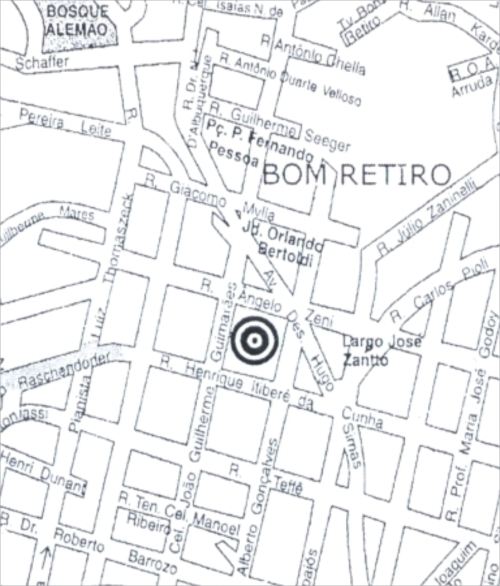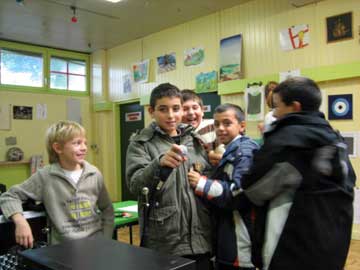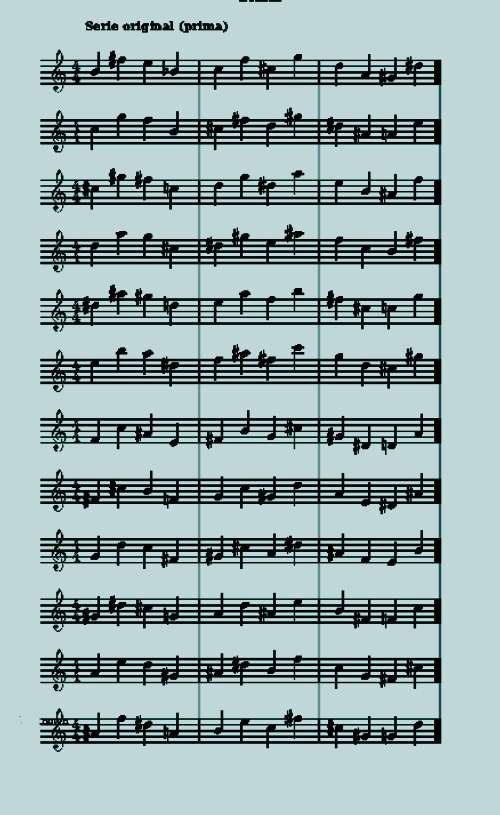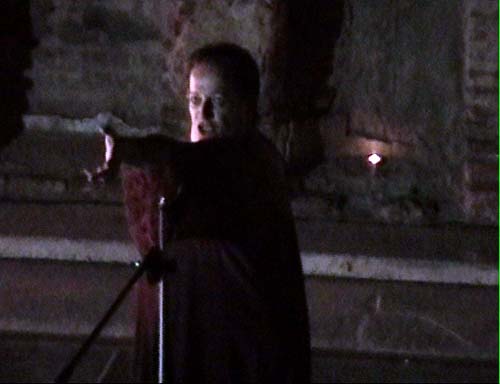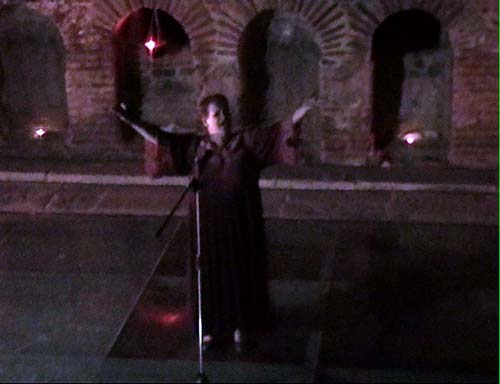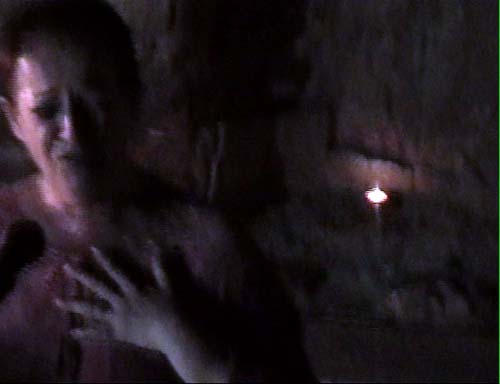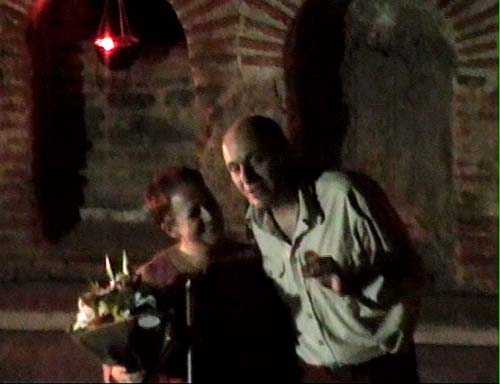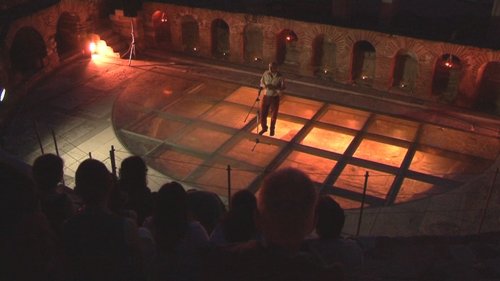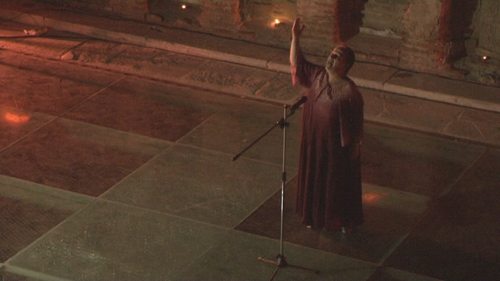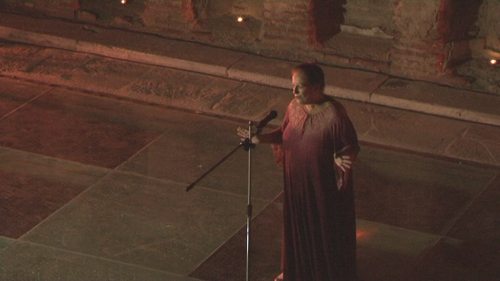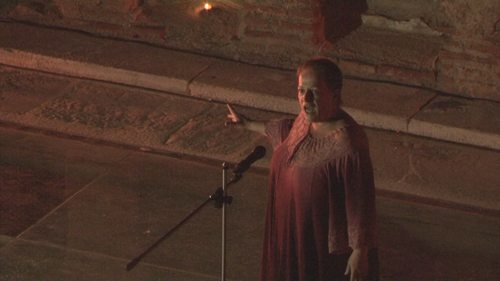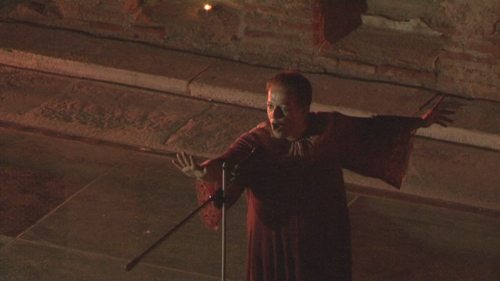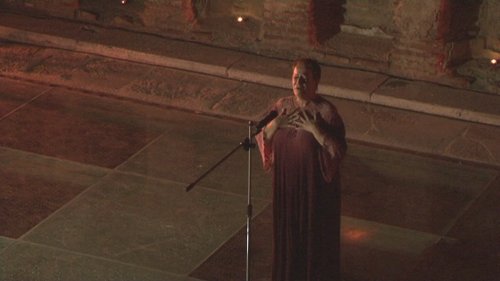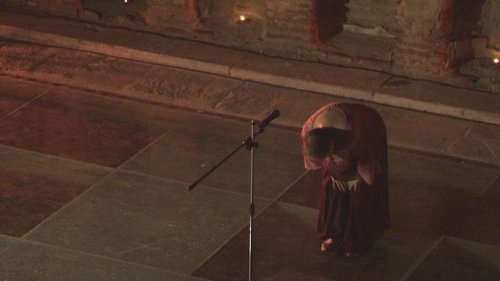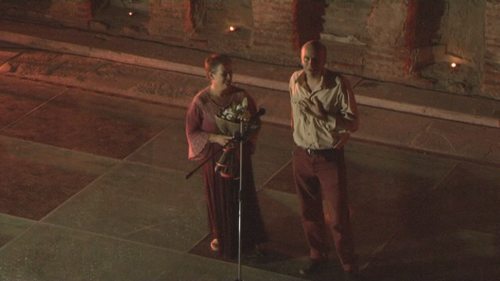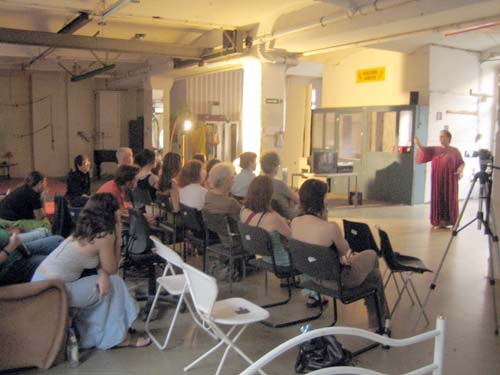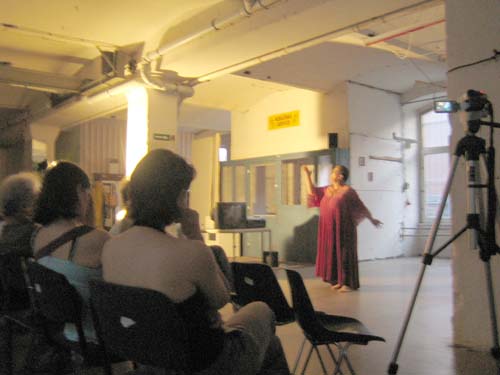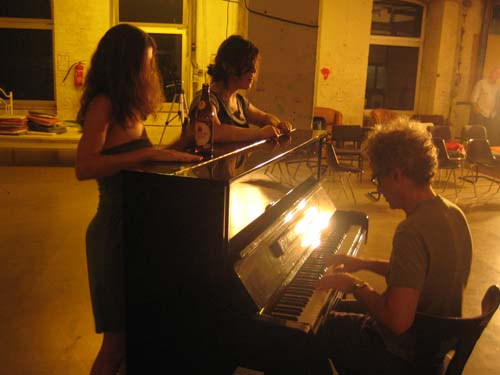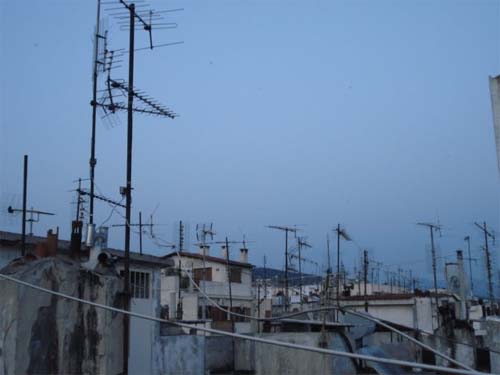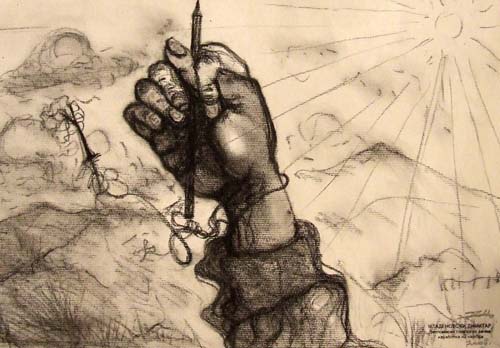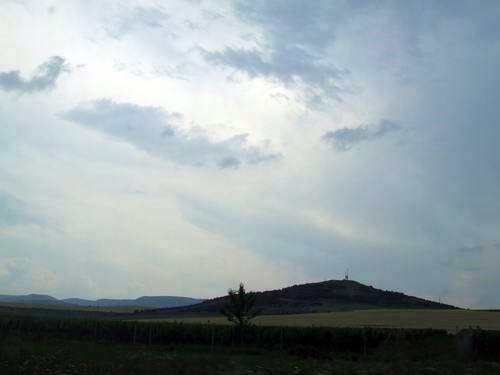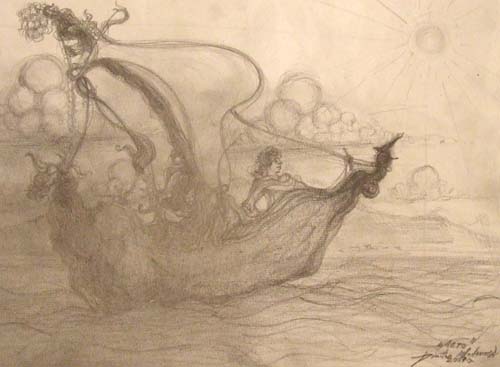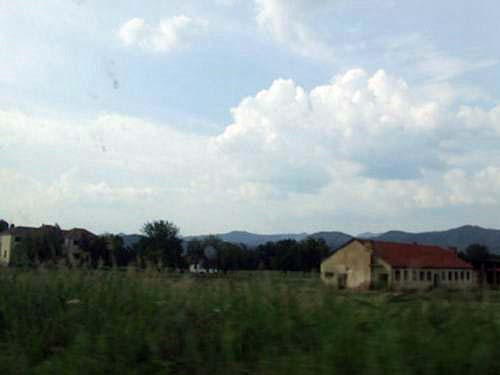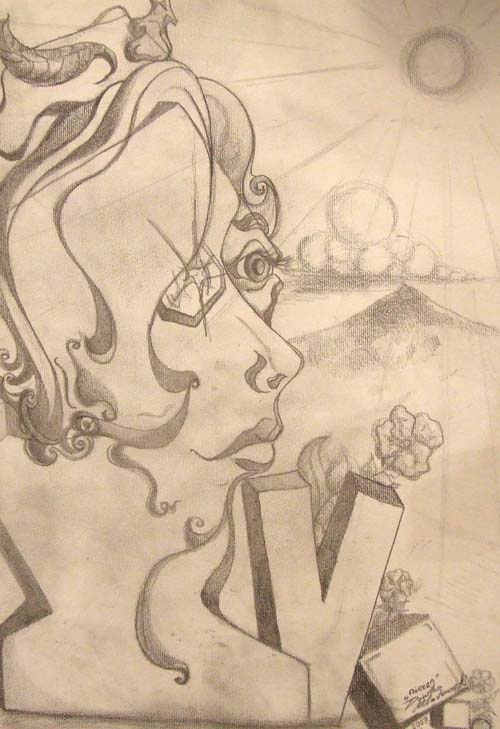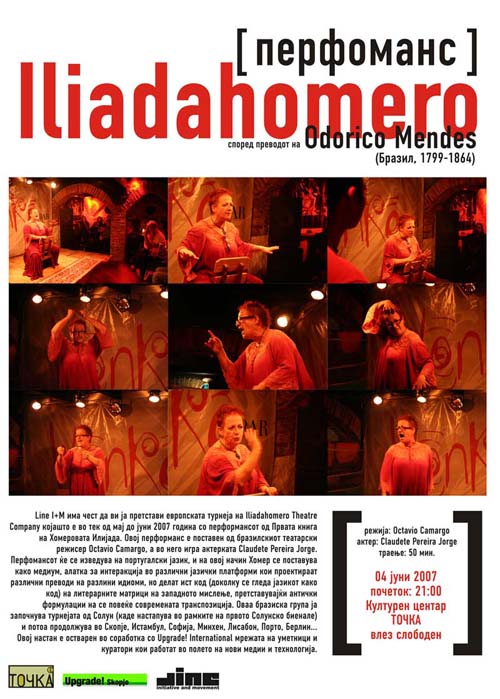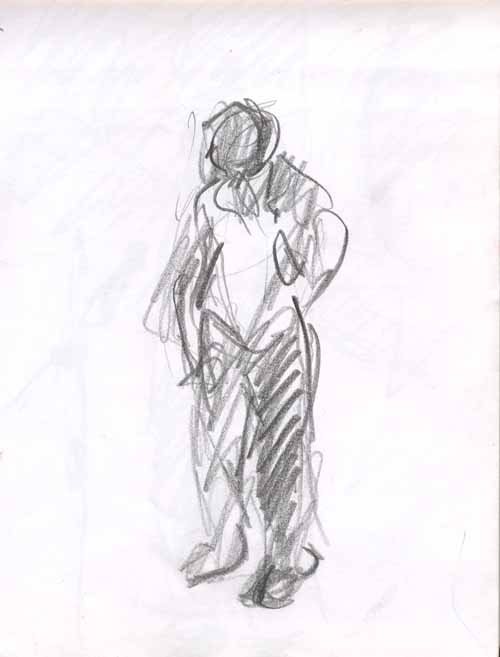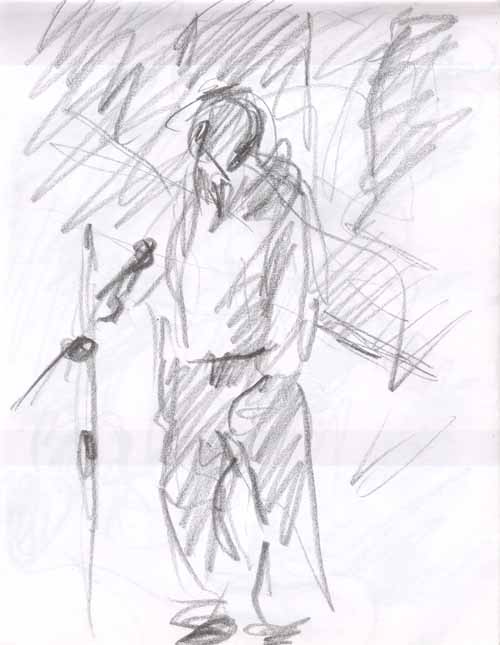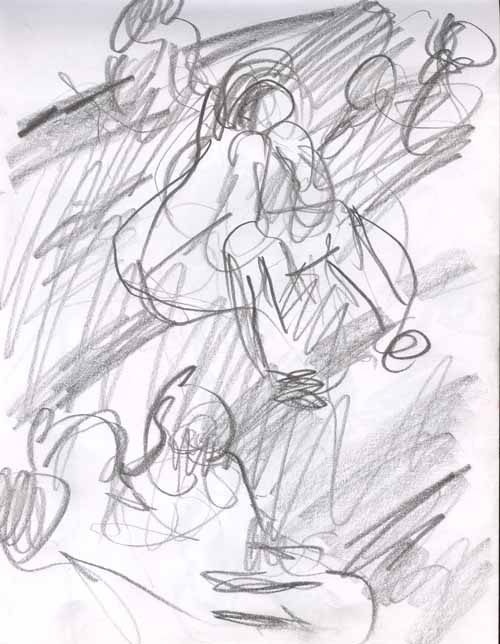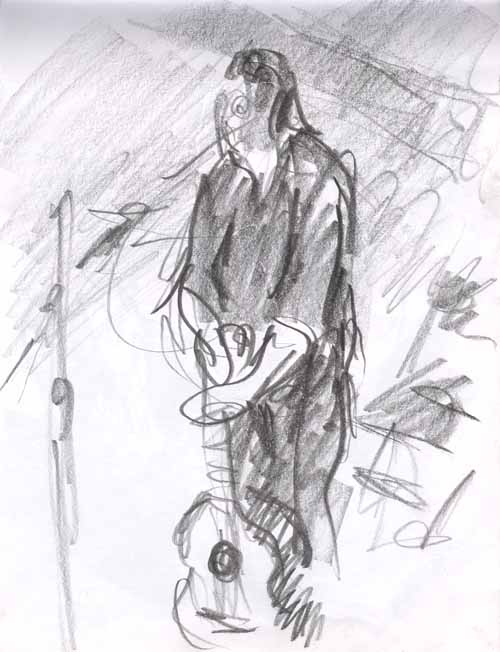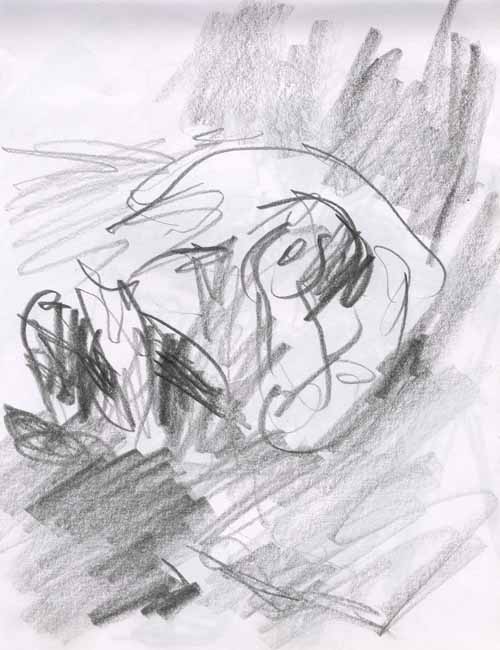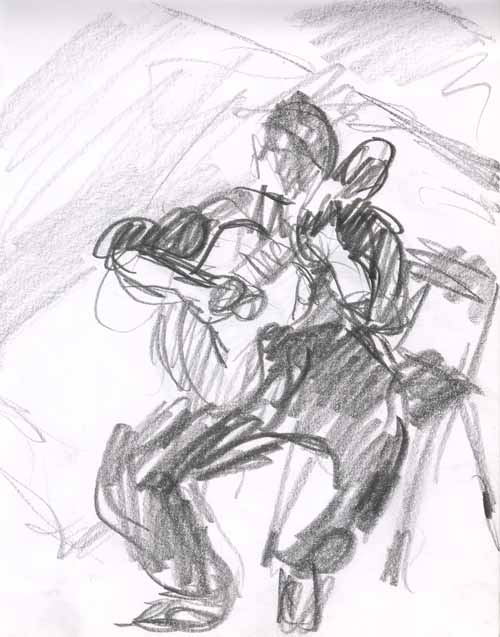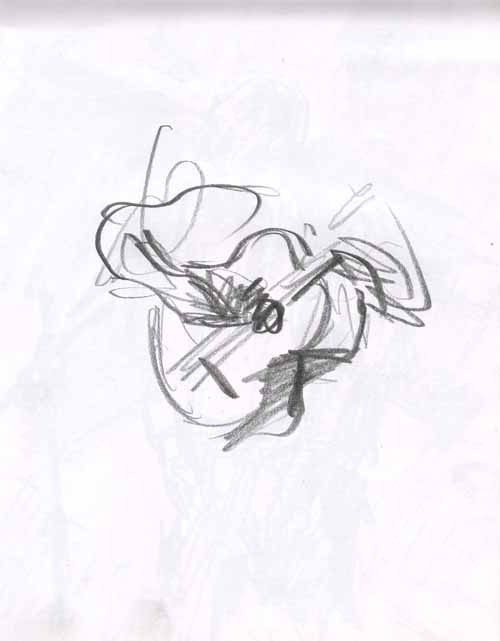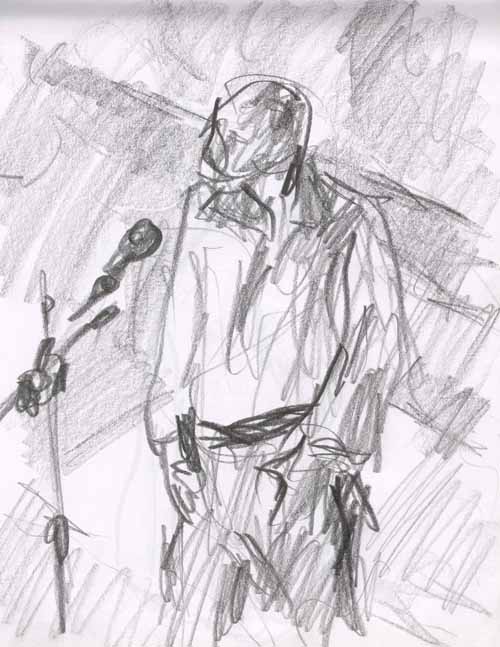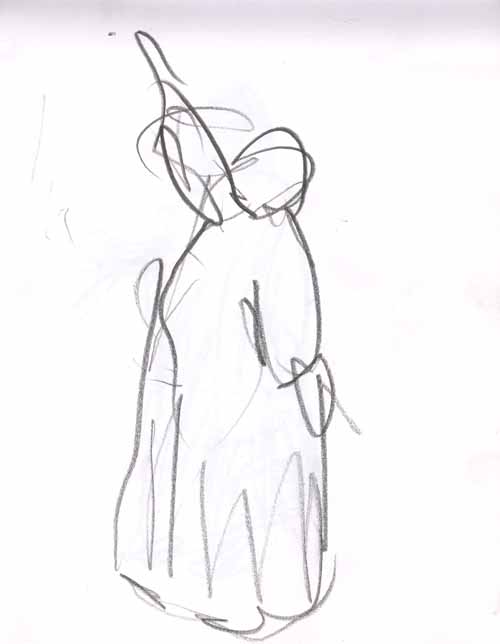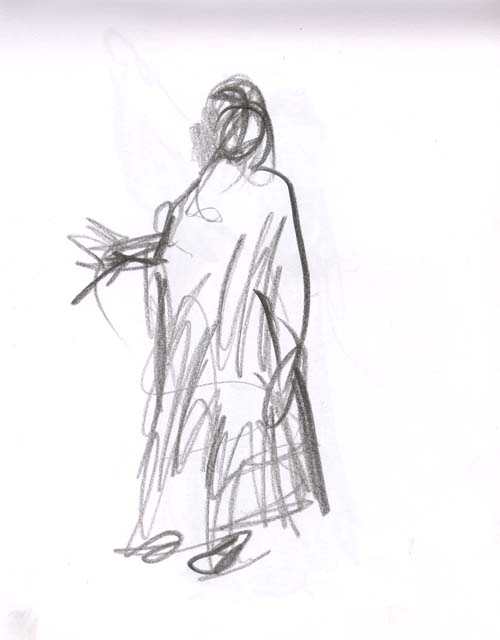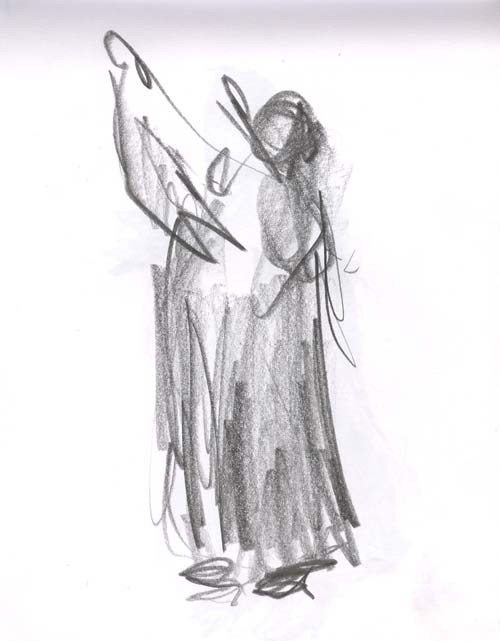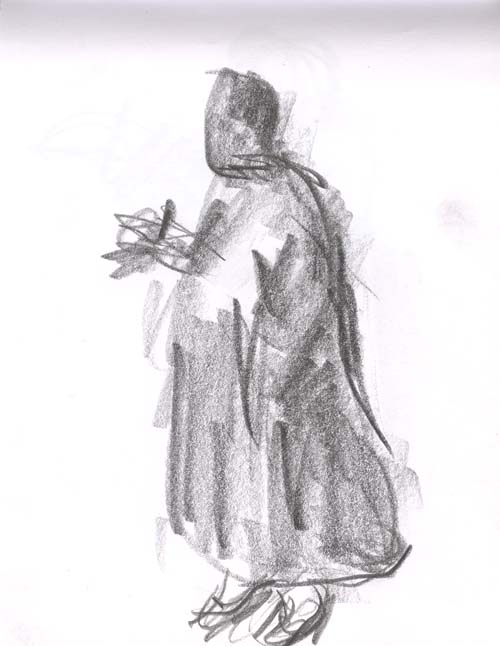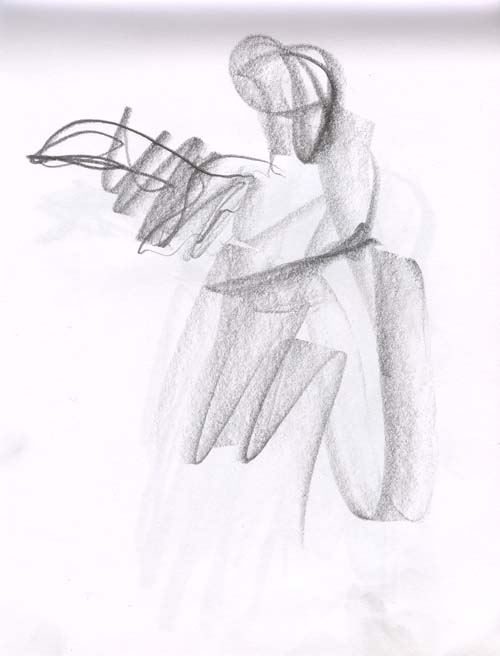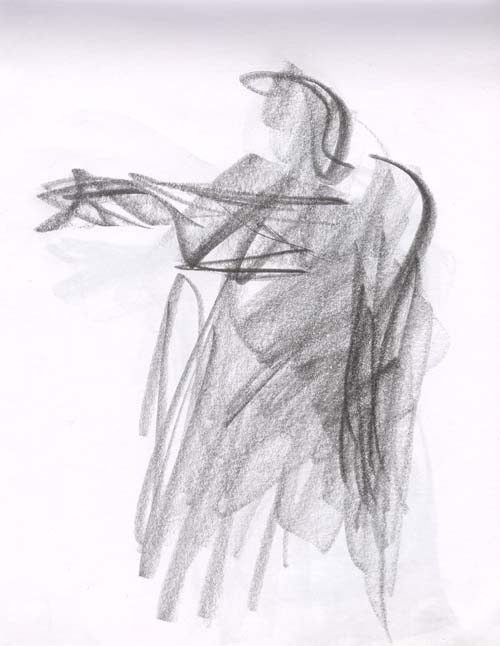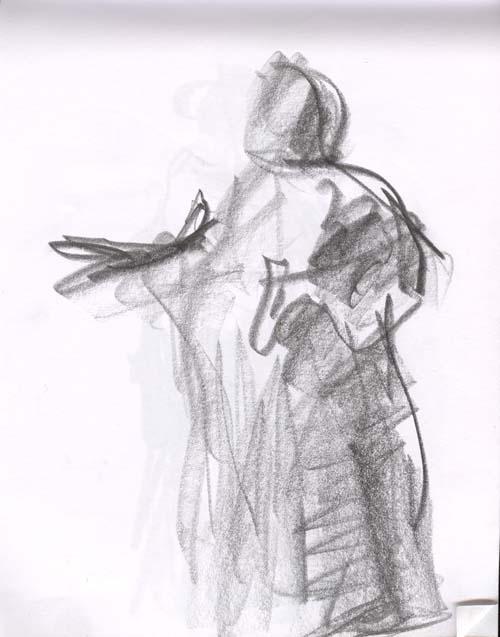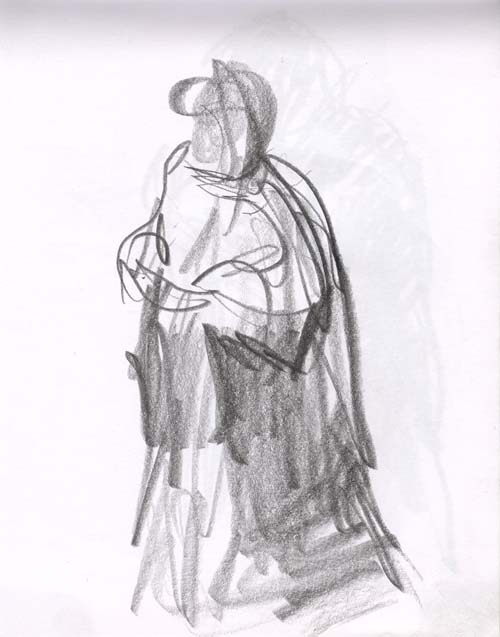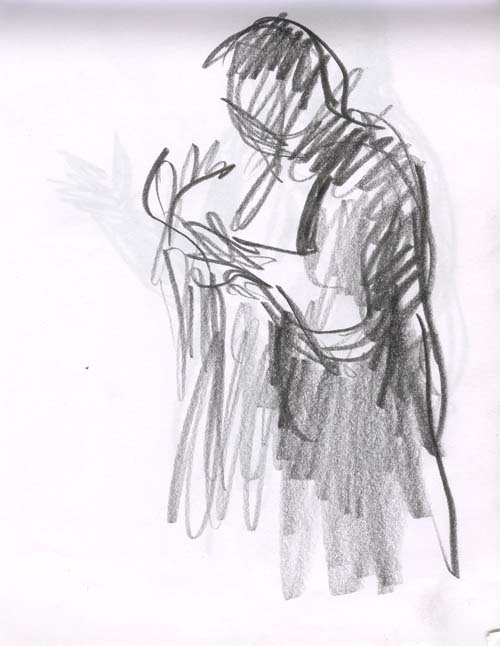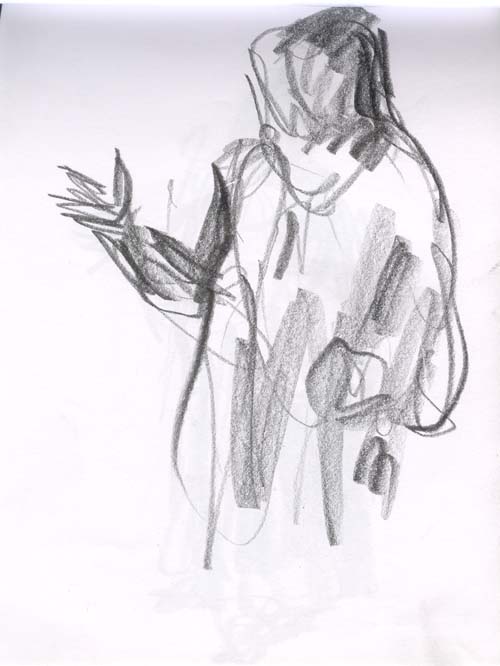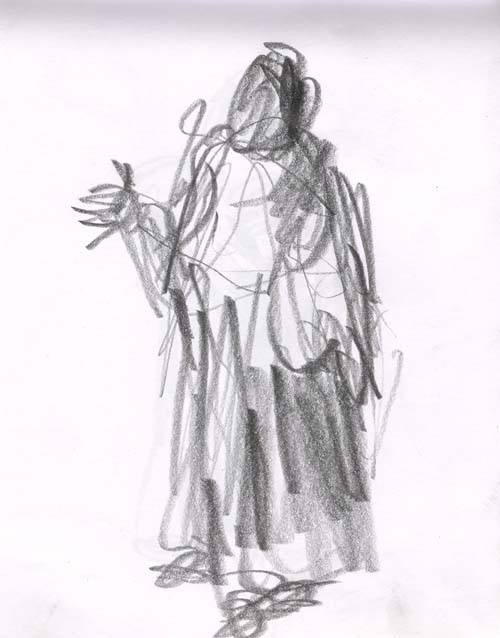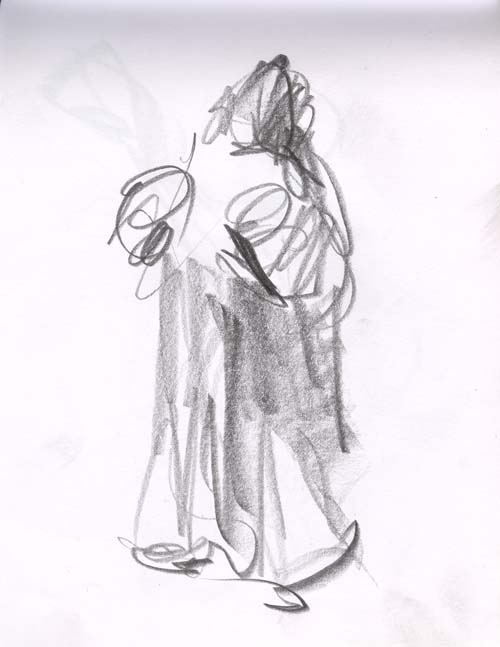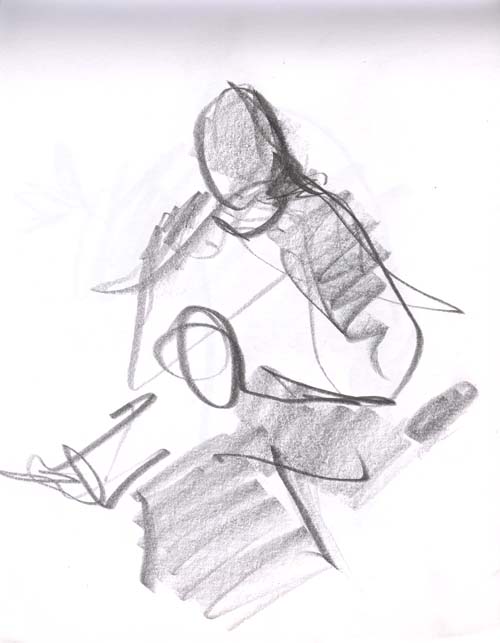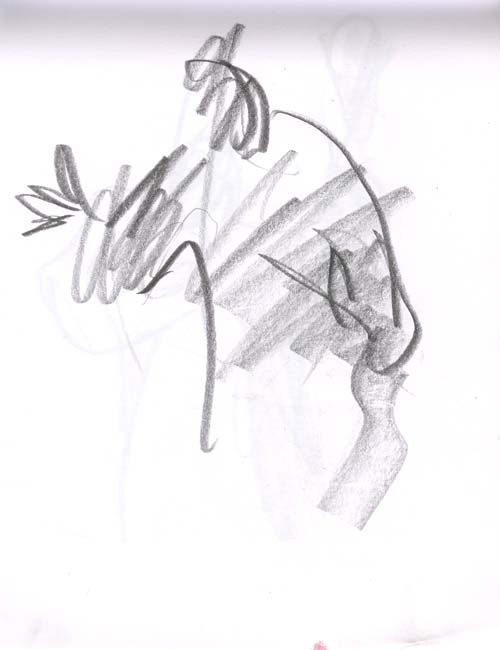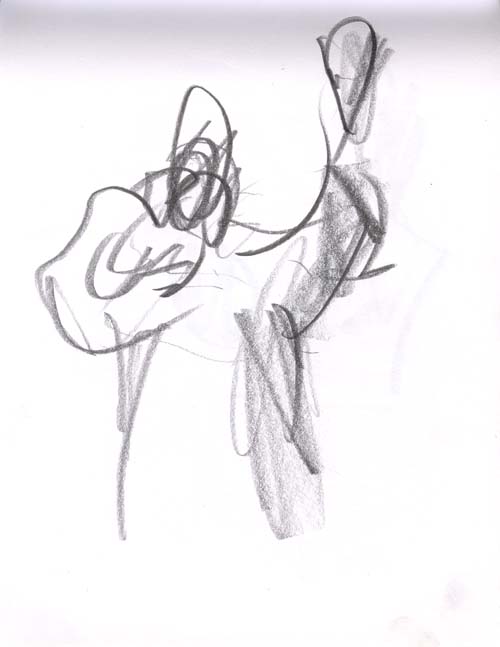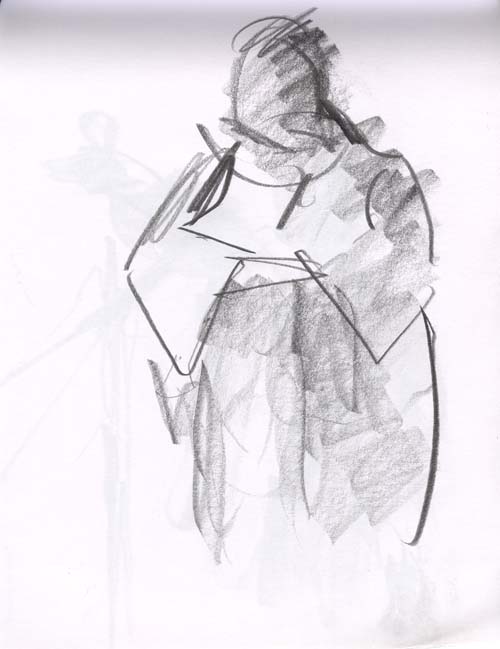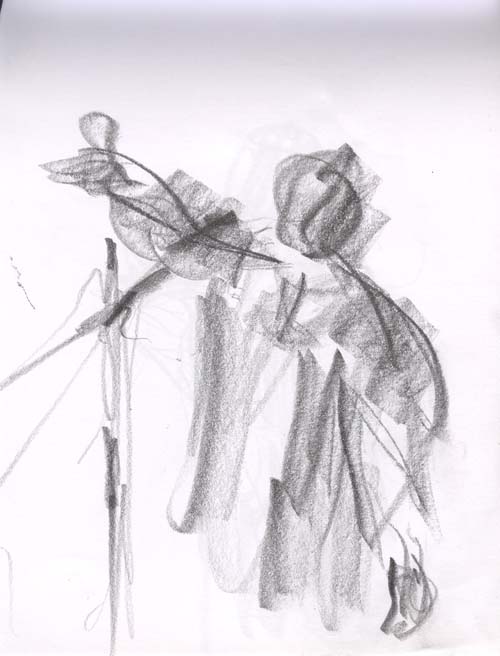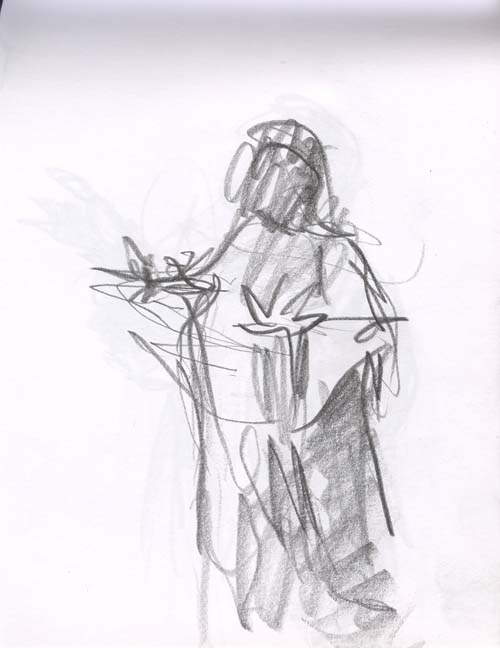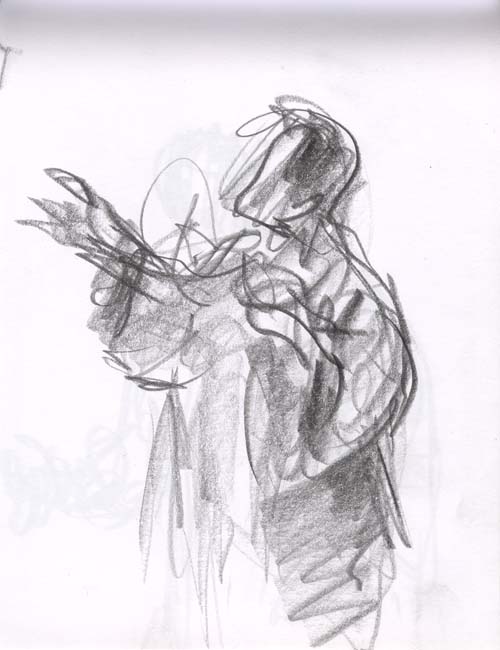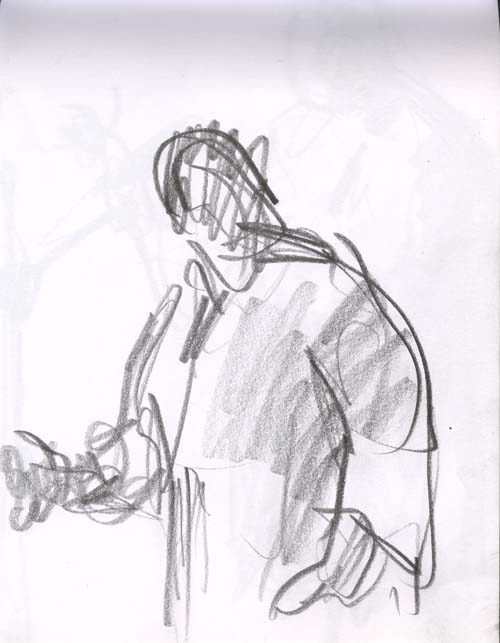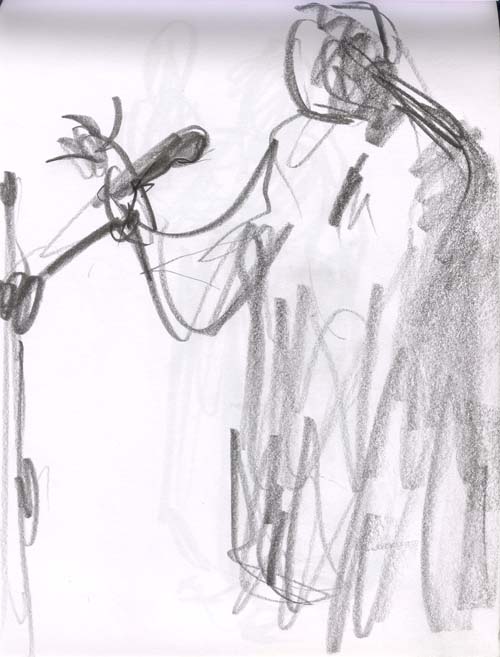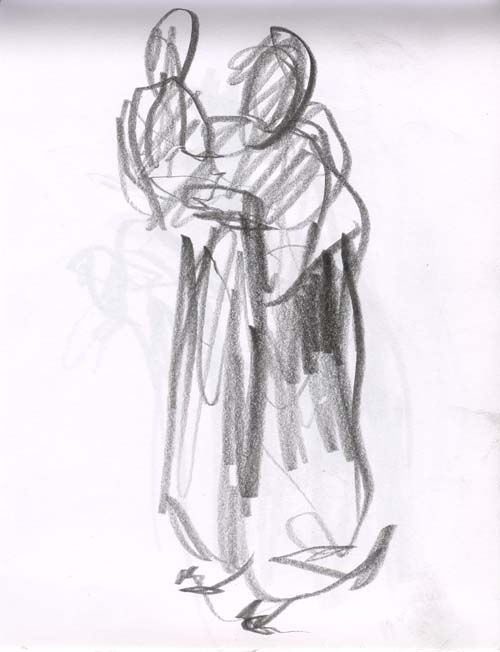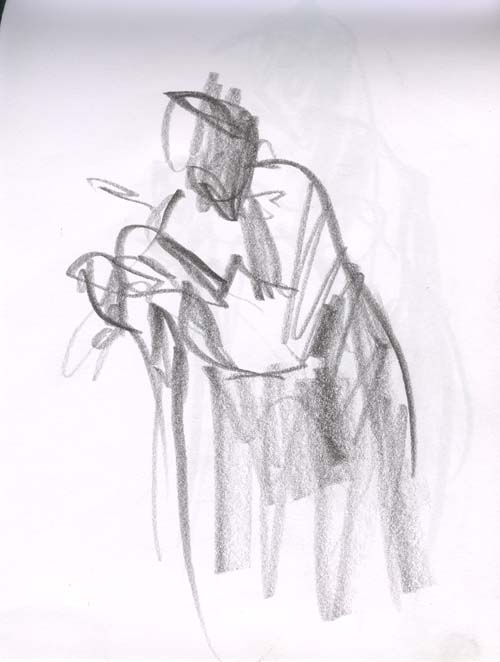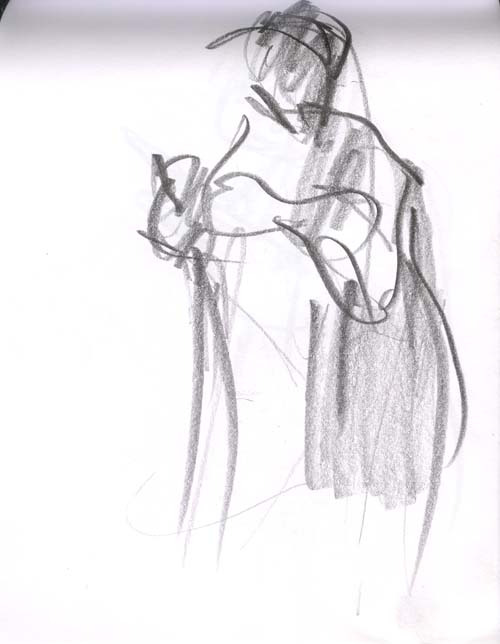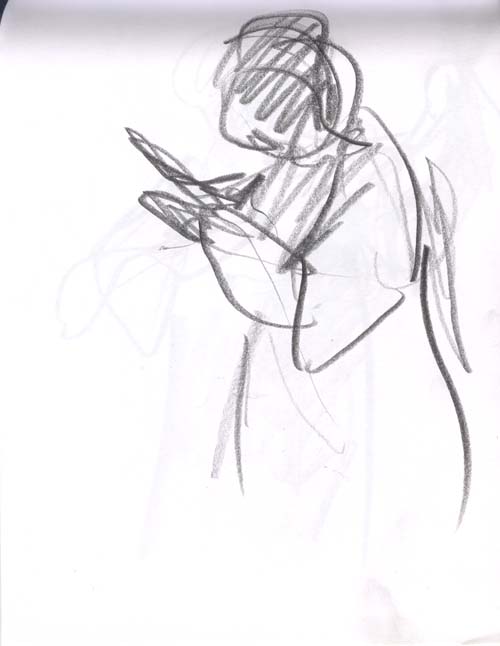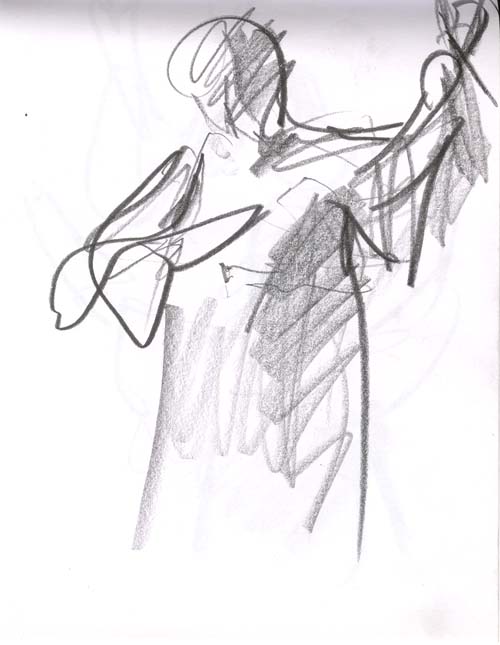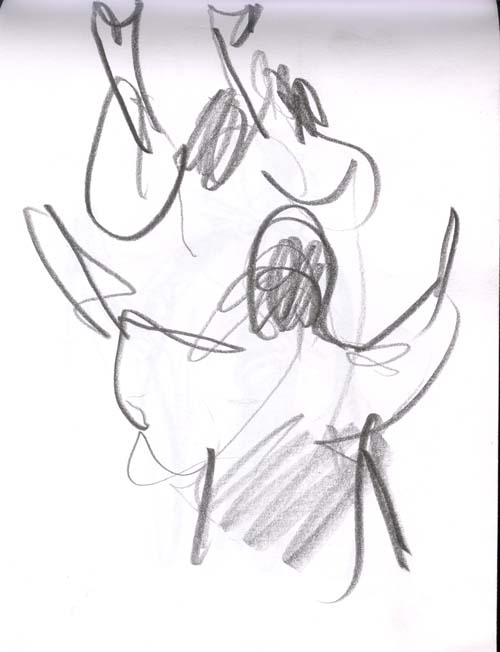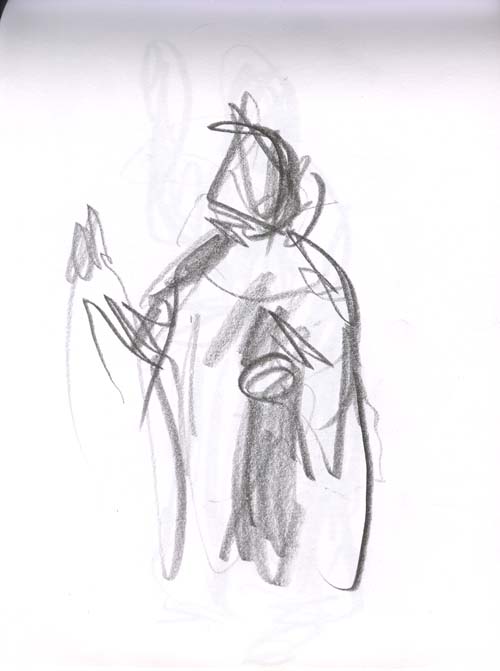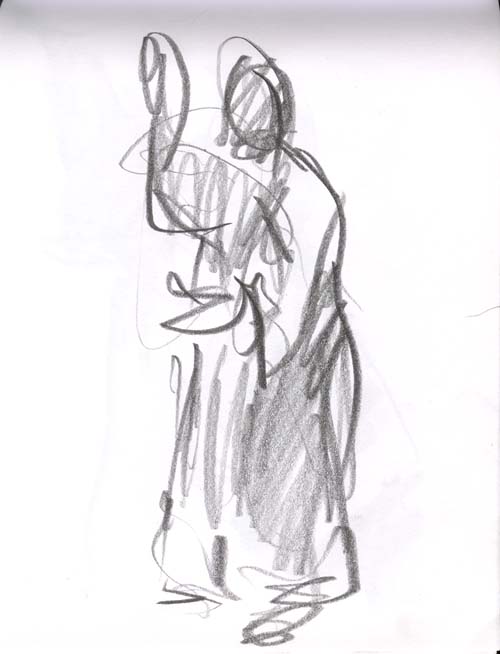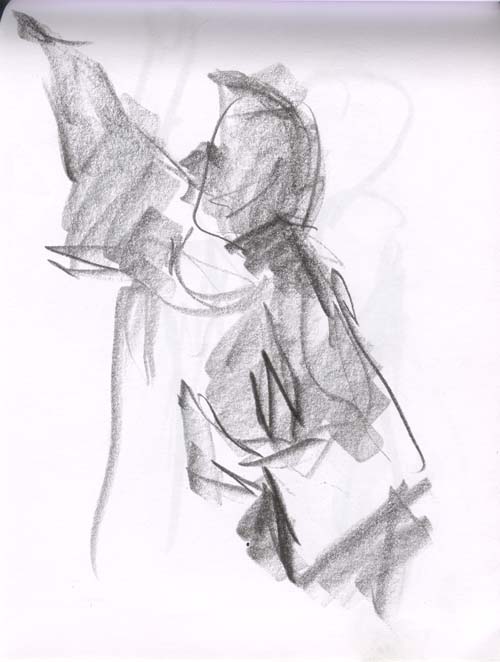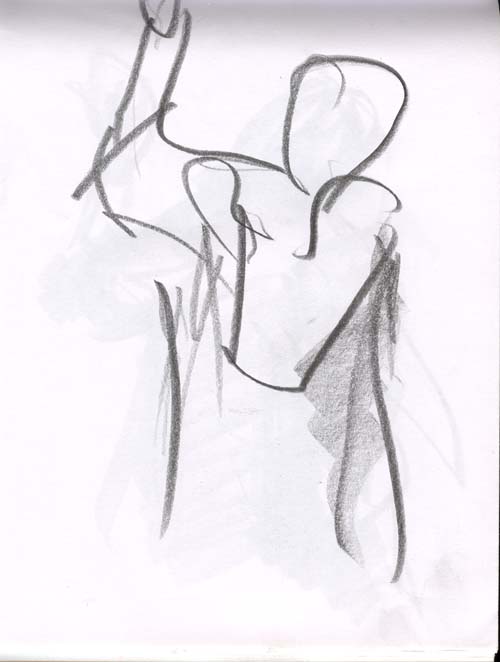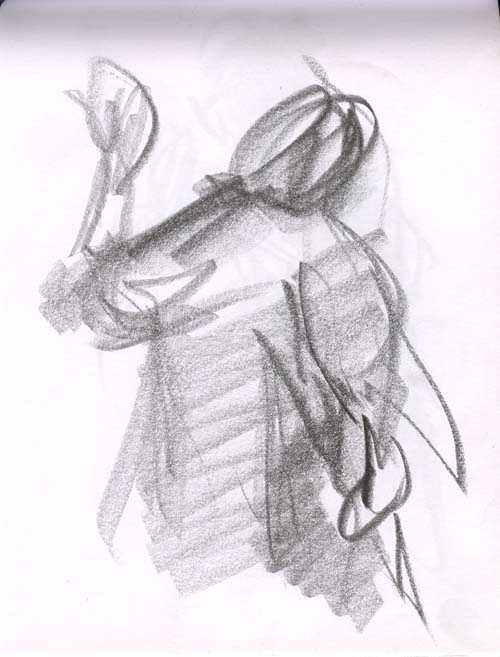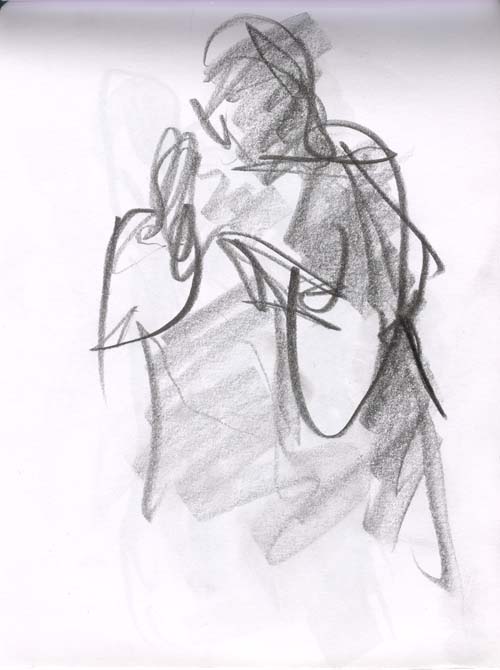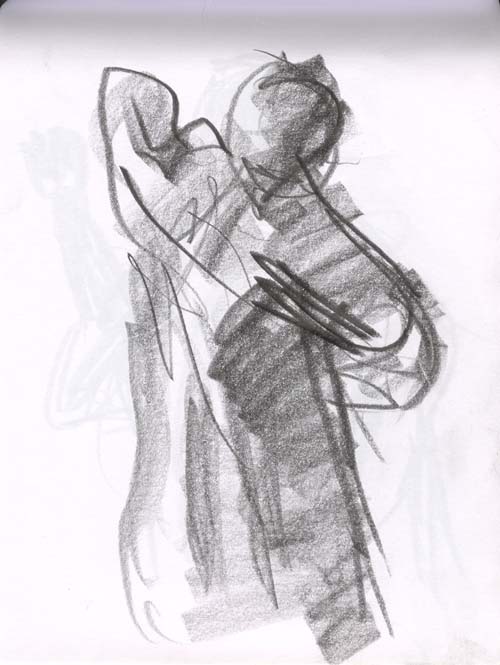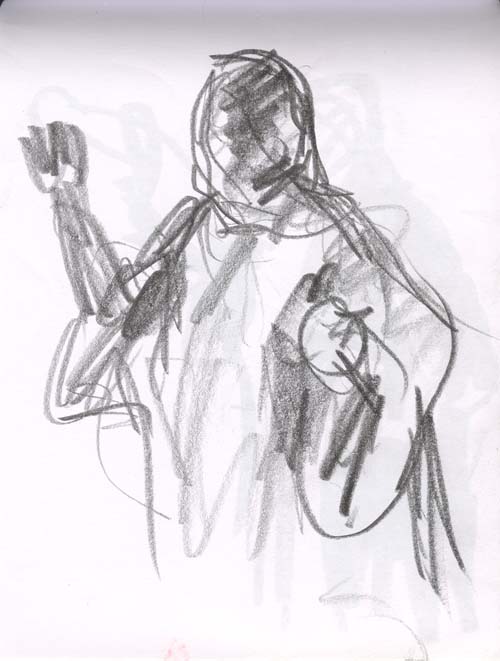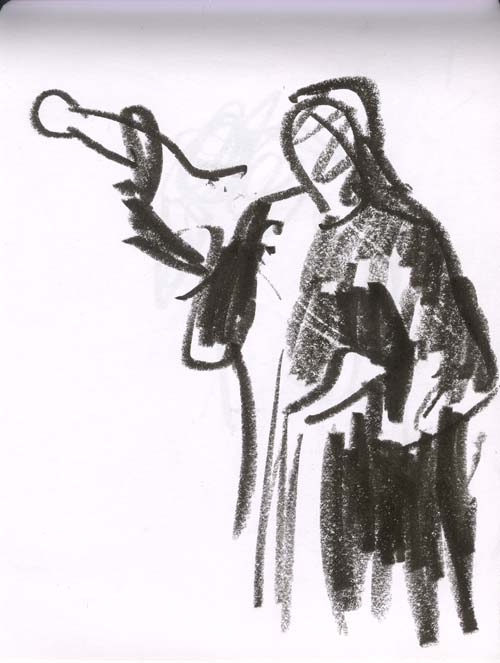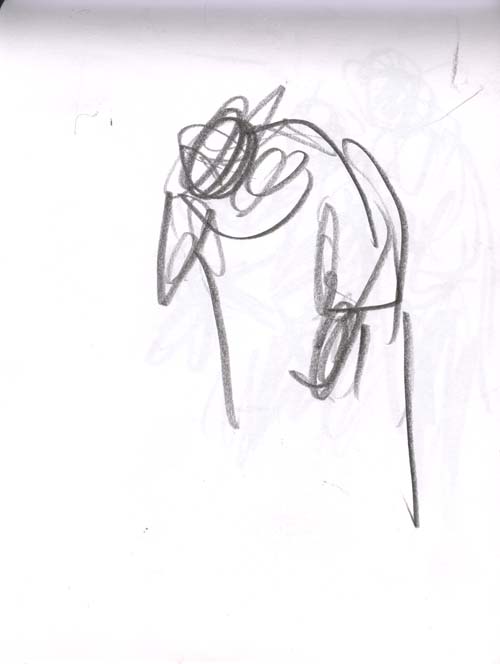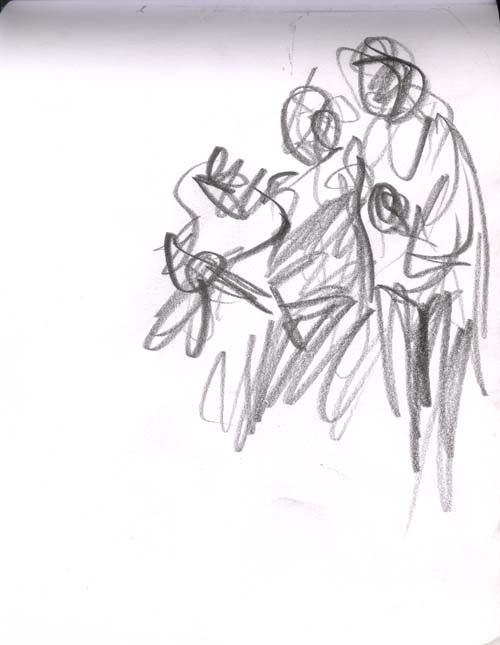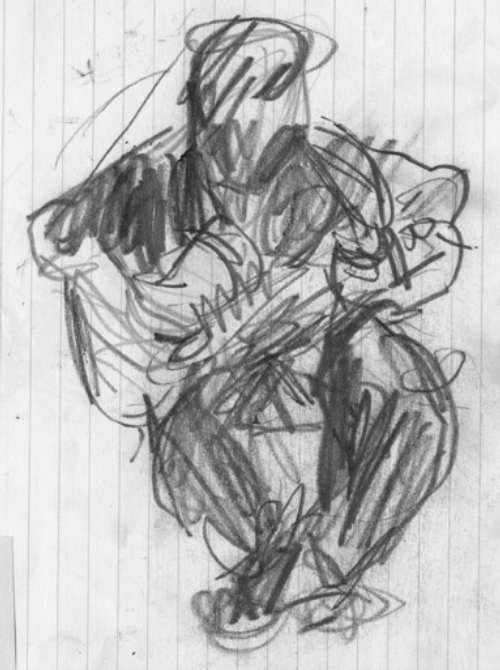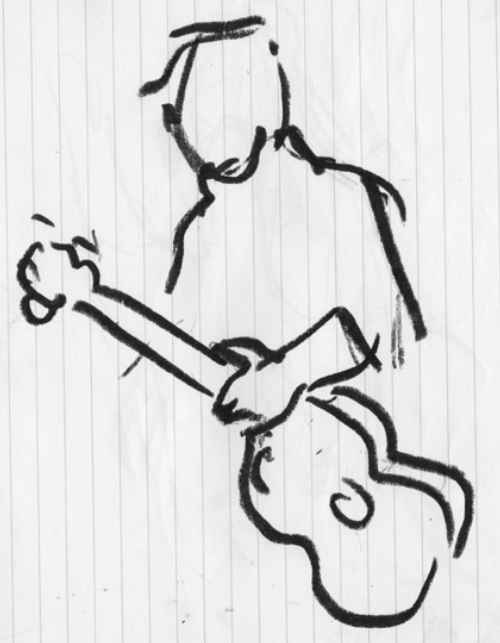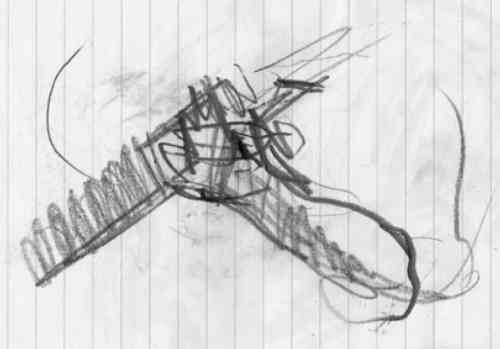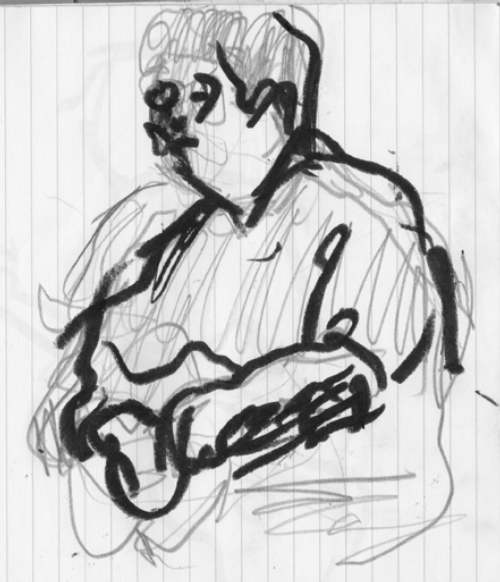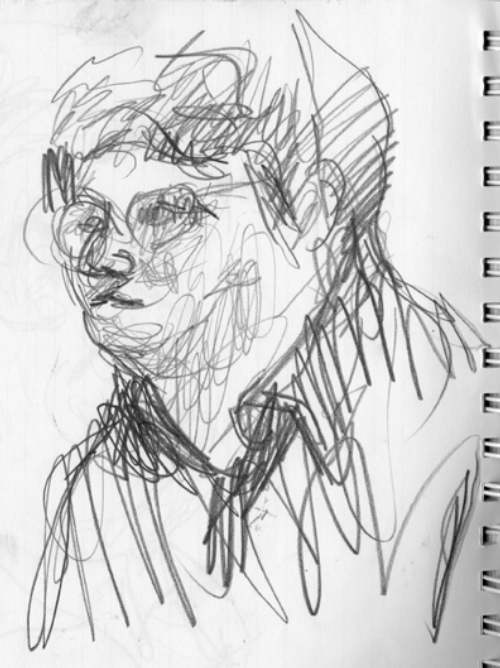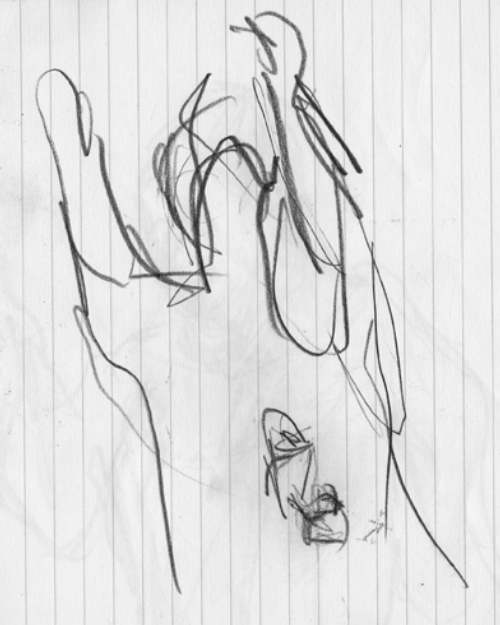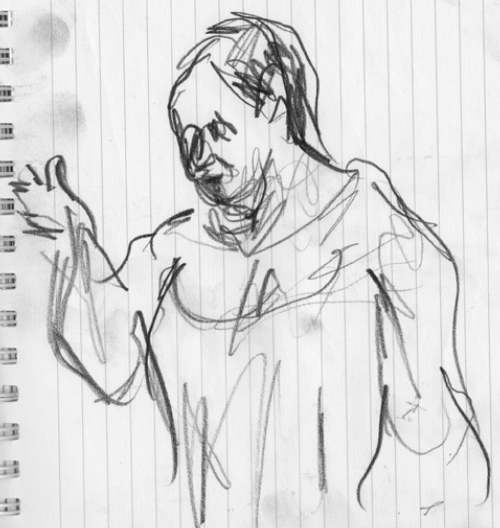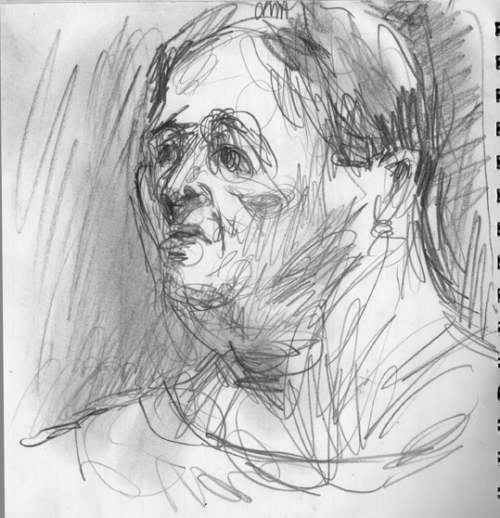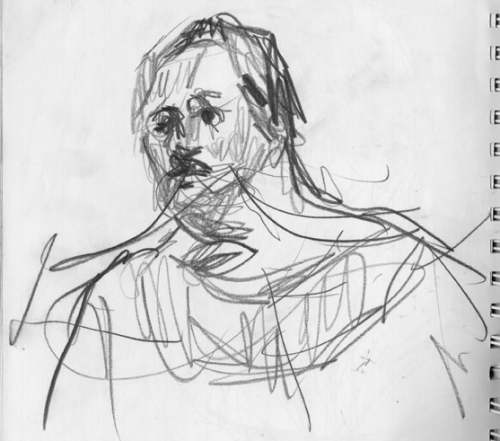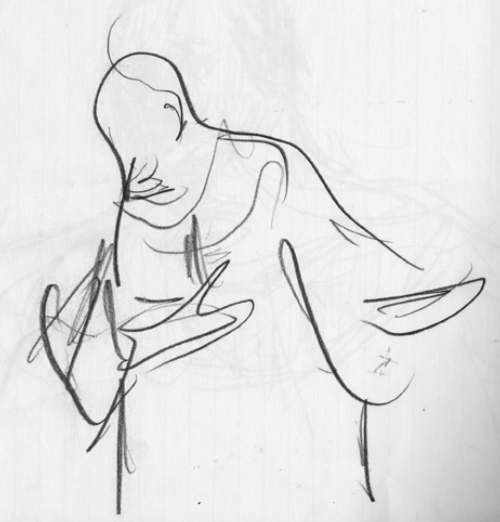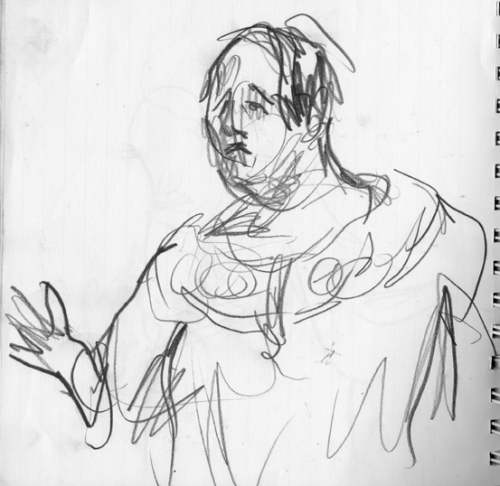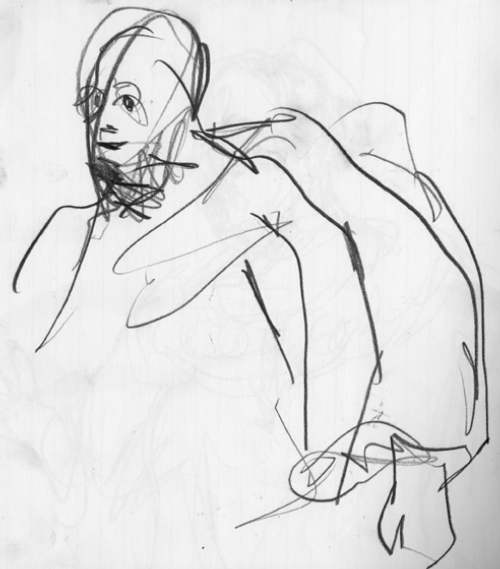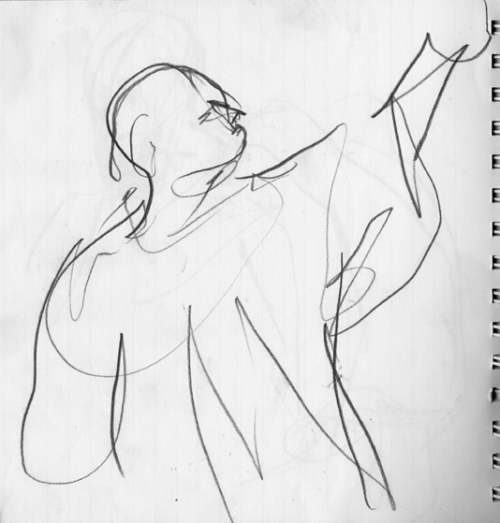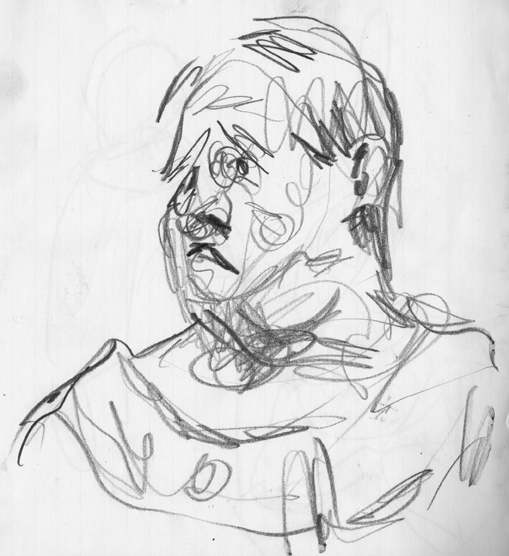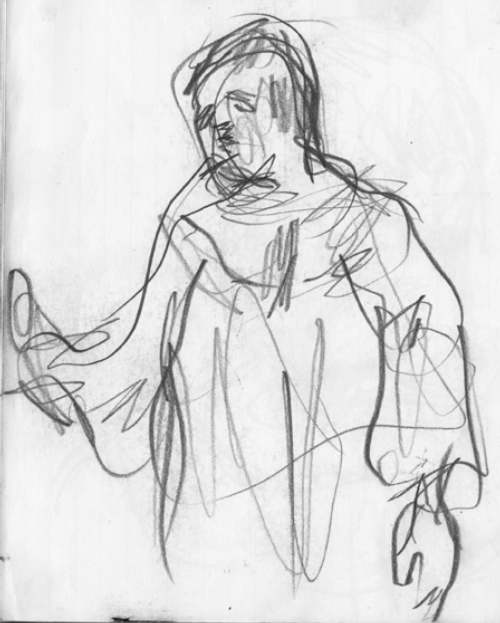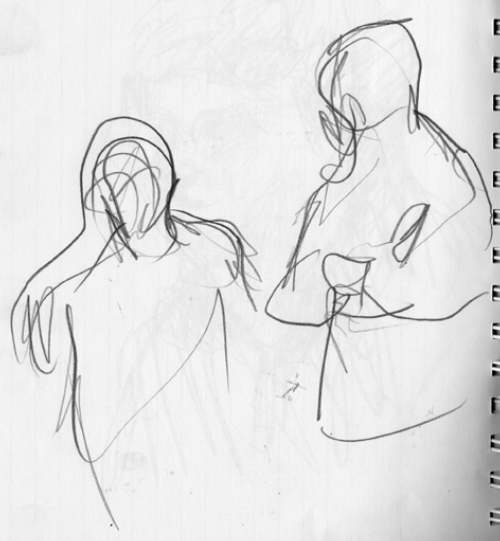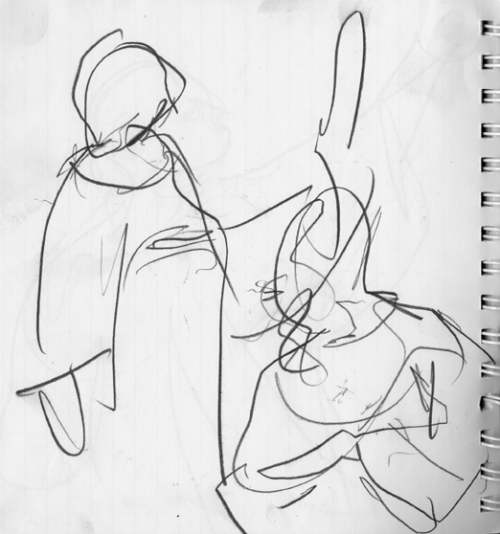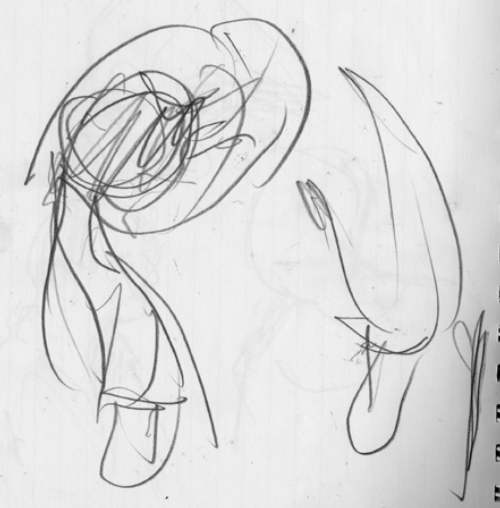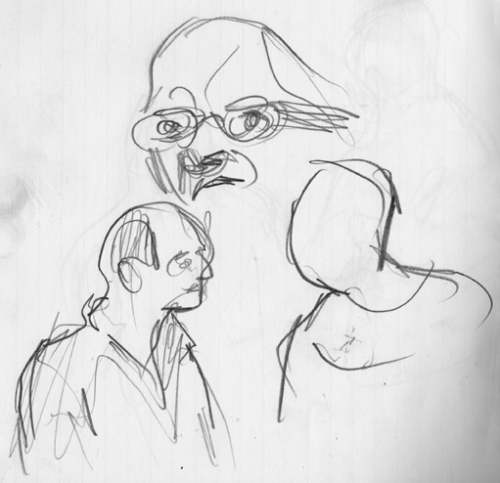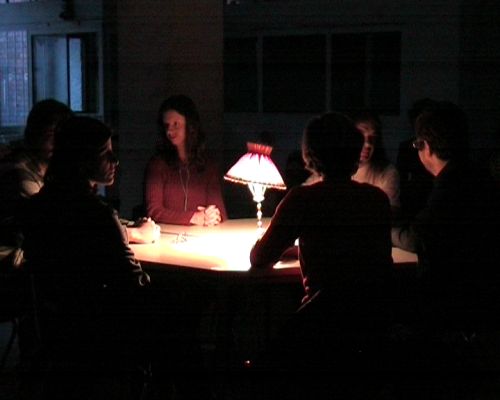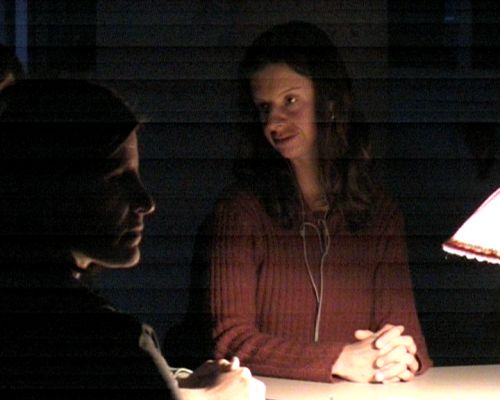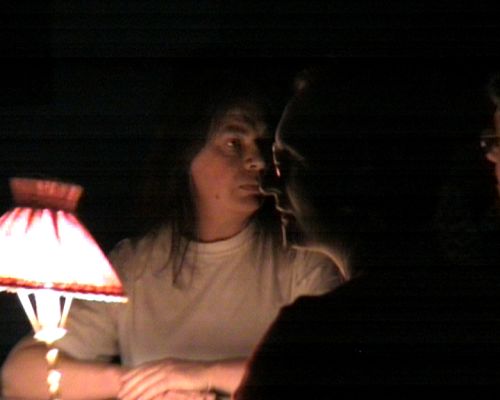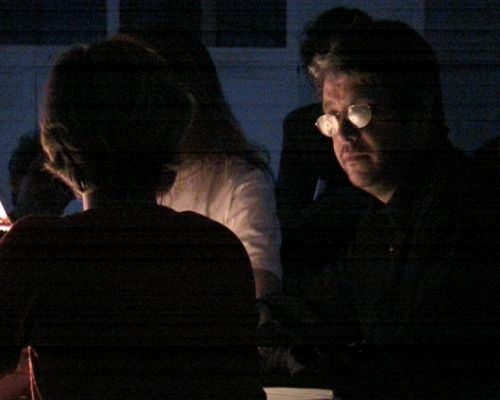http://iliadahomero.wordpress.com/
http://hackeandocatatau.arquiviagem.net/iliadahomero
Author: octavio
destino das Oito/Fate at Eight/Schicksal um acht – chico mello
It was a good luck that the festival MaerzMusic had two promising focal points – the human voice and the Brazilian music. Especially in Brazil the experimental and most involved musicians often are getting in touch with popular music. Chico Mello lives in Brazil and in Germany. He created his own style of music theatre. Here he is combining the for the Brazilians very important form of TV soap opera, the ââ?¬Å¾Telenovela”, with Bossa Nova. The result heââ?¬â?¢s calling TELEBOSSA. His piece, with the title ââ?¬Å¾Destino das Oito/ Fate at Eight”, was first performed in a marvelous light and ironic-imaginative production by Christina Tappe at the Berlin festival MaerzMusik.
The dramatic basis gave the British author Caryl Churchill. On the other side Chico Mello discovered with his own son how important repetitions are for narrating stories.
For this reason Mello was able to reflect in a light and ironic way the stupid and at the same time abysmal rituals of every day rituals, constantly served by TV soap operas.
Musically Mello connected the cool sensuality of Bossa Nova. He permitted the singers and musicians just to use certain notes and rhythms. The result was a sound on the golden mean in-between Alban Berg and Joao Gilberto. Rarely contemporary music theatre as Chico Mellos DESTINO DAS OITO – without falling in cynicism – offers so much ground for laughing and reflection.
Volker Michael, Deutschlandradio Kultur, Berlin
The play
A family waits for the return of the daughter. Captivated in the vacuum of every-day rituals the couple Brian and Alice repeats together with aunty Maisie again and again the same procedures. Change lies in commonness with trivial problems: misunderstandings, conflicts with the wayward drunk son, feelings of guiltiness, fear, old secrets, affairs, addictions, absurd encounters, departure, death. Will the daughter arrive? Will she bring the redemption from the deadlock?
ââ?¬Å¾Destino das Oito – Fate at Eight – Schicksal um Acht” is the setting to music of the drama ââ?¬Å¾Heartââ?¬â?¢s Desire” (1997) by the famous British Author Caryl Churchill. Caryl Churchill, born 1938, is one of the leading British dramatists. Her plays are extremely political and deal with social alienation and mechanisms of power. Very effectively she combines formal dramatic experiments with exciting political issues
In ââ?¬Å¾Heartââ?¬â?¢s Desire” the realistic situation of waiting for the daughter becomes a dramatic unrealistic elaboration – the story of waiting is narrated in a non-linear way. The dramatic development constantly is interrupted and restarts from the beginning. In a situation of a reset the story gets a new possible development. Every reset, every repetition includes musical and scenical variations. The result: an absurd and funny, constant perplexity of references in time and space.
The grotesque play with repetitions and interruptions get in the musical setting of Chico Mello a new dimension. Every beginning brings new variations and events and clears up the exciting patterns of the dramatic play.
The concept
The narrow patterns of family, the family issues themselves are very similar to the dramatic constructions of popular TV soap operas, of the famous Brazilian ââ?¬Å¾Telenovelas”. The action itself seems to be realistic, full with social and psychological situations of the brasilian every day life. This genre of soap opera gives a high emotional identification for a huge audience. For a big part of the brasilian population the main protagonists are as close as family members. The everyday life is dedicated to the world of Telenovelas – the Telenovela copies problems of the common life.
The formal and dramatic constellation of ââ?¬Å¾Heartââ?¬â?¢s Desire” gives an ideal basis for an investigation of this entanglement. Similar as is in a TV setting the audience can experience how the protagonists fall into their own soap opera. For this reason the play ââ?¬Å¾Heart`s Desire” becomes a free interpretation in the fictional telenovela ââ?¬Å¾Destino das Oito – Fate at Eight – Schicksal um Acht”.
By linking together different possibilities of action and dramaturgic developments in one series, by the scenic interaction of real action and telecasting, by mixing pictures from real telenovelas and live-videos arises a performance where the borders of TV and reality, of real and artificially produced experiences fade away.
The most important Brazilian telenovela is daily broadcasted at eight o�clock: a collective fate, broadcasted at eight, played by fictional protagonists, experienced by the majority of a huge tv-audience.
The music
The musical composition takes this dramatic structure and works with it�s patterns of repetition and variation. The recurrent basic situation is taken for a musical fundament and opens many possibilities for the exploration of an own musical language. The composer develops a special musical vocabulary. This he adds to the harmonies of the vocals of the English text. The result will be a fine grid of melodies, that are not motivated in a psychological or affective way, but offer an artificial construction for the naturalistic scene. In this exciting combination of Chary Churchill`s excellent composed text, the artificial vocal inflection and a naturalistic scene the rich diversity of the play becomes evident. The funny absurdity and the complexity of trivial daily scenes become even more obvious.
The clear language patterns made the composer develop an own “alphabet” of pitches directly out of the vocals and consonants of each syllable of each word. Chico Mello constructed an own system of composition that gives every figure it`s special character, and of course repeating í non harmonic – melodies to each reply. The basis of the work is the entire text.
Each singer-actor has 1 or two 2 accompanying instruments, as follows:
Brian + Bariton Saxophon + Contrabass
Alice + Clarinet + Viola
Susy + Celesta
Maisie + Oboe + Violine
Lewis + Tuba + Contrabass
Official + Percussion
Similar as in previous compositions (“Amarelinha” and “do lado de lá” for orchestra), Chico Mello works with ââ?¬Å¾decontextualisation” of Boss Nova. The “Tele”-“Bossa” is a combination of brasilian Telenovela and the musical genre of ââ?¬Å¾Bossa Nova”. In both forms strong emotions are produced by repeating patterns. The difference is the melo-dramatization of emotions in telenovelas to the static condition of happiness and sadness in the Bossa.
In the new music-dramatic form of ââ?¬Å¾Telebossa” the dramaturgy of telenovelas is so to speak ââ?¬Å¾bossanized” – an exciting contradiction, intensified by the scenic action.
A confusão das línguas não deixa margem para o rio das dúvidas banhar a ouro e verde as esperanças de todos nós
a justa razão aqui delira
leminski – fragmento do catatau
pg 34 ed. sulina
leitura eletrônica em inglês – catataulido.ogg
“Preserva-se do real numa turris ebúrnea; o real
vem aí, o real está para
Todo o tiro é susto
cuidado –
esperanças dos
Rovlox diz fruto
toupinamboults e tamanduás;
outras raridades urânicas
pousada em cada
aiurucatinga, um tuim, uma
araracá, uma araracã, um araracanga,
catálogo de caapomonga, caetimay, taioia,
tudo morto!
já
com o nome na testa dentro
com uma dízima periódica por
é diurético, esse é
antisséptico,
Lançamento da Revista GLOBAL número 9 em Curitiba, no e/ou
Sumário
Trânsitos
Defender e construir a efetividade do Governo Lula, Giuseppe Cocco
Chega de chororô, Caia Fittipaldi
Sobre cansaços e golpismos, Adriano Pilatti
Conexões Globais
Notas sobre o protesto contra o G8 na Alemanha, Till Baumann
O êxodo constituinte da multidão, Leonora Corsini
É preciso que o ar circule, Walter Melo
“Que haces acá?” Giulia Janelli
Perguntar caminhando (parte2), Tomás Herreros Sala
Desde Bolívia – entrevista a Antonio Negri, Giuseppe Cocco, Judith Revel e Michael Hardt
Caderno Brasil do Le Monde Diplomatique
O impasse boliviano, Antonio Martins
Universidade Nômade
Enade e Ações Afirmativas são eficazes, Alexandre do Nascimento
O obsceno de nossa universidade, Bruno Cava
A ética da democracia contra a moral da punição, najup/UERJ
Dossiê: Constituição do Comum
Cultura digital: para além da fragmentação, Fábio Malini
A cultura é a economia, Paulo Henrique de Almeida
O Prefeito e o Presidente na Terra do Sol, Barbara Szaniecki
Maquinações
Multitudes Icônes versus Documenta Magazine, E.Alliez e G.Zapperi
Mato Grosso tem A Fábrika, Eduardo Ferreira
Uma conversa com Rosa Mitô, Fabiane Borges e Verenilde Santos
Museu da Maré: memória da resistência, Gláucia Dunley
“Vidas Matáveis”, André Barros, Marta Peres e Pedro Bento
mapa do e/ou
A revista GLOBAL/Brasil número 9 tem o apoio do
Programa Cultura e Pensamento
Patrocínio:
Petrobrás e Ministério da Cultura
Realização:
Fapex
Co-Realização:
TVE Bahia, SESC-SP, Rede Nacional de Ensino e Pesquisa, Ministério da Educação
Social Music Kiosk – Vienna
Social Music Kiosk
(on-air, on-line: http://www.kunstradio.at, Sunday, Nov 25th, 23:00
Brandon LaBelle
In conjunction with the Kunstmarkt event held at the Schí¶pfwerk housing community in Vienna in October 2007 where art was used as a meeting point for social diversity, Social Music Kiosk functions as a gathering of different narratives related to art and social environments. Originally staged as an artistic contribution to the Kunstmarkt, the Kiosk functioned as a participatory sonic platform, inviting visitors to add to the mix by way of their favorite CDs, audio reports made on-site, and live treatments and interactions. Using the Kunstmarkt as a base, the radio work overlays multiple inputs: a series of audio recordings made by local residents and visitors to the Kunstmarkt, an interview and discussion with the organizers of the Kunstmarkt and social workers from Schí¶pfwerk, and electronic treatments. Part-documentary, part-question and answer, and part-mix, the work is a telescoping of multiple perspectives onto a social topography.
http://www.kunstradio.at/2007B/25_11_07.html
Thanks to Ulla Ebner for her DJing, Annette Stahmer for her assistance, and to Rudolfine Lackner, Renate Schnee and Sabine for their invitation and conversation.
*
Brandon LaBelle is an artist and writer working with sounds, places, bodies, and cultural frictions. He is the author of Background Noise: Perspectives on Sound Art (Continuum 2006) and co-editor of the Surface Tension (Errant Bodies) series. His recent work Prototypes for the mobilization and broadcast of fugitive sound was exhibited at the Enrico Fornello Gallery, Prato. He teaches at the University of Copenhagen and is currently developing projects on street cultures.
http://www.errantbodies.org/labelle.html
a solidão não mata… dá a idéia
Claudete Pereira Jorge
texto: Alexandre França
A minha solidão hoje sorriu diferente, ela doeu meu choro contindo. A minha solidão foi surpreendente, me mostrou o que eu sou quando estou comigo. Hoje chorei como quem caminha para casa. Sou aquele cara interessante, a viver com a solidão ao lado, a cumprimentar os outros sentimentos de longe. A me achar bonito nos outros. A solidão me machucou, pois revelou a sua doença de permanecer para sempre nos meus olhos. Ela me falou baixinho no ouvido as minhas dúvidas. A solidão foi cruel esta noite, ela me contou o que eu sou nos mínimos detalhes. Eu não quero isto para ninguém. Não façam como eu, não levem em consideração o que a solidão fala. Pois dei ouvidos a ela e acreditei que eu não servia para nada. A solidão não mata, dá a idéia. A solidão se diz minha amiga, mas me faz dormir num lugar sujo com um ser humano solitário. A solidão mora em quem ela quer. As pessoas não tem a escolha de rejeitá-la. Ela come o nosso melhor pedaço, espera os outros comerem a carniça da alma. A solidão não tem calma, lambe o prato até o suco da vontade. A solidão que eu tenho eu não recomendo para ninguém, até por que foi eu quem a criou. A solidão não demora em narrar-nos o momento. A solidão nos causa sofrimento sem querer.
A solidão adulta permanece acordada, mesmo quando dormir é inevitável
.
Carvão – canção de Alexandre França e Edson Falcão
http://alexandrefranca.blogspot.com/
cozinha aberta / Sesc
a cozinha aberta estudiolivre.org é um espaço aberto para produção e publicação de mídias livres, utilizando ferramentas livres.
atraves das praticas cotidianas de uma simples cozinha, pessoas poderão criar sua propria arte/expressão atraves de ações lúdicas, podendo realizar desde o preparo de uma simples omelete com picadinho de fotografias, ate uma ópera composta com o som de eletrodometicos, sempre tendo como como base conceitos de obras abertas, produções coletivas e trabalhos colaborativos
gracas ao uso de ferramentas livres e de licenças abertas para a publicacao de seu material na internet, o participante que criar sua obra-comida-processo dentro da cozinha e quiser publica-la, terá seu trabalho exposto na galeria de trabalhos na pagina da cozinha aberta:
texto extraído da pagina:
http://www.estudiolivre.org/cozinhaberta
Fotos e informações em:
http://cozinhaberta.wordpress.com/
http://www.flickr.com/photos/cozinhaberta/
mapas e materiais – P zero em suas 12 transposições – conSerto
Iliada Canto 1 / Claudete Pereira Jorge / Roman Agora / 1st Art Biennale of Thessaloniki / 01-06-2007
Upgrade_Berlin / Iliadahomero / Studiob�¼hne / 08-06-2007
As apresentações de Claudete Pereira Jorge do Canto 1 da Ilíada, na tradução de Odorico Mendes, nas cidades de Skopje, Atenas e Berlin, foram agendadas através da colaboração entre o Upgrade Berlin, a Orquestra Organismo e o Grupo Reconstruction. Em Berlin, a performance aconteceu no Studiobühne, no bairro de Kreuzberg.
Esta convergencia foi possível atraves do trabalho de rede de pesquisadores de tecnologias livres no Brasil e do Upgrade Internacional, na busca de formas autonomas de gestão de intercambios culturais, possibilitando o surgimento de novas amizades. Segue o documento inicial deste network
Hi everyone,
This is quite a long email, It intends to be a documentation and a first route of ideas generated by the conversations with Ela Kagel and Horst Konietsny, here in Berlin. The idea is to create interfaces and links around the collective works of Upgrade (http://www.theupgrade.net/), Orquestra Organismo (www.organismo.art.br/blog) desCentro (www.pub.descentro.org) and Surface Tension (www.errantbodies.org)
As a first step to the idea of residences, both in Brazil and in Europe, we could start connecting some artistic rituals through digital technology in the web. This would bring a closer interaction straight away among the Upgrades, with the use of structures that are already at hand. It may also be a way of finding ressonances among people, putting them in contact, and identfying the specific fields of collaboration.
I see a similarity between the project of mobile-studios (http://mobile-studios.org/), by Ela kagel, the MimoSa (http://turbulence.org/Works/mimoSa/), by Ricardo Ruiz, and Jose Balbino’s idea of Building a house for residences in Arembepe, Bahia (http://midiatatica.org/upgrade/mar2629.html ).
I can also see relations of these moving structures for art in the recent piece by Brandon Labelle “Dirty Ear Recordings” in ST_Copenhagen (http://errantbodies.org/st_cphlabelle.html
and http://hackeandocatatau.arquiviagem.net/?p=1865) and in the research that took place in Curitiba (http://hackeandocatatau.arquiviagem.net/?p=1474 and http://hackeandocatatau.arquiviagem.net/?p=1458) of the waste cycle for paper collectors (http://errantbodies.org/activecirculation.html and http://hackeandocatatau.arquiviagem.net/?p=426), no place like home, and eiXos (http://hackeandocatatau.arquiviagem.net/index.php?s=axis } These actions meet in the idea of recycling of technology through creative production
The relation between “mobile and fixed stations for art” meet in the specific aspect of colaborative development. A very curious historical link towards this attitude is the work of the polish artist Bruno Lechowski and his passage through curitiba in 1925 with his Cineton (a moving structure for art exhibitions that traveled around Brazil in the 20s) – : http://hackeandocatatau.arquiviagem.net/?p=602“cooking with pure data”, (http://errantbodies.org/st_cooking_pure_data.html)is a web interactive action that was first performed in a Surface Tension event in Curitiba, 2006, by orquestra organismo, (http://errantbodies.org/st_insertions_curitiba_vh.html) and then in Barcelona, in the same year (http://www.hangar.org/ and
http://www.estudiolivre.org/el-gallery_view.php?arquivoId=1764).
(People are invited to come for a meal in someone’s home or in a galery. The
lights in the space,blenders,and other eletrical equipments are online to be turned on and off from the web, creating an interactive cooking jam. In the action “garden of volts”, lemons are linked by cobber wires to produce electricity, which is transformed in sound waves through pd. (this creates a musical instrument out of squashing lemons, demistifying the means of producion of eletrical energy)http://www.estudiolivre.org/el-gallery_view.php?arquivoId=1764
There are also plataforms for immediate exchange of collective work. The blog of orquestra organismo “Hackeando Catatau” has a wordpress template which is completely open for collaboration. Anyone can register and it has inputs from many different parts of the world.
desCentro’s web site (http://pub.descentro.org/) is also an important meeting point for open source actions in Brazil and abroad.
The Orquestra Organismo has just made an event in Curitiba in April, 2007.
The documentation can be found at the web site of the event
(http://conserto.organismo.art.br) The exhibition had a close relation with Upgrade Salvador and the ongoing Croat research of free open source in brazil { http://www.uke.hr/brazil/}Another possibility for immediate collaboration and a larger connection of upgrade is the Iliadahomero project – sharing the code of the matrixes of the occidental languages to a larger public –
It is thoroughly documented at ( http://hackeandocatatau.arquiviagem.net/?p=1863)
The Iliadahomero Theatre Company was invited to present the performance of the book 1 of the iliad (a 50 minutes performance with Claudete Pereira Jorge) at the oppening of the participation of the PPC_T/Farkadona at the 1st Art Biennele of Thessaloniki. The invitation came from the Coordenator of PPC_T/Farkadonna, Hariklia Hari. This could also generate a series of performances in the cities that are linked to Upgrade in our way back to Brazil (first week of June 2007).Well, I think it is already quite a lot! Hope this effort can bring good perpectives for everybody to meet new friends.
best for all
Yours,Octavio
Na perforrmance no Studiobühne, a presença dos amigos reidentes em Berlin: Os compositores Chico Mello e Laura Mello, e a atriz Fernanda Farah
PPC_T/Farkadona – 1st Art Biennale of Thessalonik – Orquestra Organismo – Iliadahomero
fotos: Thiago Novaes
fonte: http://picasaweb.google.co.uk/tnovaes
Estas imagens foram feitas durante a participação dos pesquisadores brasileiros em tercnologias livres na 1a Bienal de Arte de Thessaloniki. Thiago Novaes, Carlos Paulino e Otavio Savietto, estabeleceram parceria de colaboração com o grupo PPC_T/Farkadona no uso de tecnologias digitais em código aberto. O trabalho tem se desenvolvido de forma autogerida e independente.
O PPC_T realiza projetos voltados a comunidade de repatriados gregos residentes em Farkadona. Informações atualizadas sobre a atividade deste grupo podem ser encontradas na pagina:http://ppc-t.blogspot.com
PPC_T/Farkadona is an interdisciplinary, self-administrated collaborative project. It consists of a series of cultural activities, workshops, devices of interaction with territory and public events. Moreover, it focuses primarily on Emergency Case Situations as seen at the settlement of the repatriated community of Greek-Pontians from the former Soviet Union in Farkadona, in the district of Trikala, Thessaly-Greece.
A cidade de Thessaloniki, porto dos portos no meditarrâneo desde o seculo III a.c, com seus predios baixos de 5 a 6 andares, é um mar de antenas. A presença da Cia iliadahomero na cidade é decorrente da colaboração entre a orquestra organismo e os pesquisadores brasileiros que prestam consultoria ao PPC_T.
O evento conSerto, marco deste intercâmbio, aconteceu em Curitiba em abril de 2007.
http://conserto.organismo.art.br
Informações sobre projetos culturais através do uso de tecnologias livres no âmbito internacional podem ser encontradas na pagina do desCentro em:
http://pub.descentro.org
O desCentro também oferece um mapeamento detalhado destes projetos no Brasil, com atualização diária.
Macedonia – Canto 1
Amasing landscapes of the mountains in the way to Skopje. The drawings of Dimitri, a new friend we made during the performance, shows three important aspects of the culture: The will for expression, through art and writting; the sea and navigation, which is out of reach; and the Victory, acompanied by the sun, the national symbol of Macedonia
Upgrade Skopje_Iliadahomero / 04-06-2007
Christos Aleveras / iliadahomero / PPC_T/Farkadona / 1st art Biennale of Thessalonki / Roman Agora / 01-06-2007
These drawings by Christos were made during the performance at the Roman Agora on the 1st of June. In the begining, Tasos Karapanagiotidis, made a short description of the contents of Book 1 of the Iliad for the greek audience. A couple songs followed this introduction, and then Claudete presented the performance of the rapsody. Some of the drawings also describe the place and the public.
Christos Alaveras / Iliadahomero / Aristotelian University / Deipnosofistai / 30-05-2007 / 1st art Biennale of Thessaloniki
Instant drawings of Christos Alaveras during the performance of Mrs Claudete Pereira Jorge at the Aristotlelian University of Thessaloniki. The performance of Book 1 of the Iliad, in the brasilian transaltion of Odorico Mendes, was followed by a lecture of Professor Charalampos-Demetres Gounelas on the writtings of Nikos kazanzakis. The drawings refer to the three parts of the event.
1 – The initial songs on the guitar (a fragment of book 16)
2 – The book one of the Iliad with Mrs Claudete
3 – The lecture of Mr Gounelas
Ã?â?? BIENNALE ãÃ?Â¥Ã?â??çáÃ?ŸÃ?ÂÃ?â??ã Ã?¤Ã?â?¢çÃ?ÂÃ?â??ã Ã?Ë?Ã?â?¢ããÃ?â??Ã?â?ºÃ?ŸÃ?ÂÃ?â?¢Ã?Å¡Ã?â??ã
 Ãâ??õí»õÃâ?¦Ãâ??í±í¯í± ÃÆ?Ãâ?¦í½í¬í½Ãâ??í·ÃÆ?í· Ãâ??Ãâ?°í½ Ã?â?õí¹Ãâ?¬í½í¿ÃÆ?í¿Ãâ? í¹ÃÆ?Ãâ??ÃÅ½í½ óí¹í± Ãâ??í·í½ Ãâ? õÃâ??í¹í½í® í±úí±ôí·üí±ÃÅ úí® Ãâ?¡ÃÂí¿í½í¹í¬ 2006-2007 Ãâ?¬ÃÂí¿óÃÂí±üüí±Ãâ??í¯ÃÆ?Ãâ??í·úõ óí¹í± Ãâ??í·í½ õÃÂÃâ?¡ÃÅ?üõí½í· í¤õÃâ??í¬ÃÂÃâ??í· 30-05-2007. í¤í¿ í±ÃÂÃâ?¡í¹úÃÅ? í¸íüí± ÃÆ?Ãâ?¦í¶í®Ãâ??í·ÃÆ?í·Ãâ?? í®Ãâ??í±í½ í¿ íí¯úí¿Ãâ?? Úí±í¶í±í½Ãâ??í¶í¬úí·Ãâ?? úí±í¹ í· íí½í½í¿í¹í± Ãâ??í·Ãâ?? õí»õÃâ?¦í¸õÃÂí¯í±Ãâ??< . Ã?Å?üÃâ?°Ãâ?? õÃâ?¬õí¹ôí® í¿í¹ Ã?â?õí¹Ãâ?¬í½í¿ÃÆ?í¿Ãâ? í¹ÃÆ?Ãâ??í±í¯ ôõí½ üÃâ?¬í¿ÃÂí¿ÃÂí½ í½í± í±Ãâ? í®í½í¿Ãâ?¦í½ õÃâ?¦úí±í¹ÃÂí¯õÃâ?? ôí¹í±üí¬í½Ãâ??í¹í± í½í± í¾õÃâ? õÃÂóí¿Ãâ?¦í½ í±Ãâ?¬ÃÅ? Ãâ??í± Ãâ?¡íÃÂí¹í± Ãâ??í¿Ãâ?¦Ãâ??, ÃÆ?í±Ãâ?? õÃâ??í¿í¯üí±ÃÆ?í±í½ úí±í¹ üí¯í± Ãâ?¬í¿í»Ã õÃâ?¦Ãâ?¡í¬ÃÂí¹ÃÆ?Ãâ??í· íúÃâ?¬í»í·í¾í·!!! í¤í¿ Ãâ?¬ÃÂÃÅ?óÃÂí±üüí± Ãâ??í·Ãâ?? ÃÆ?Ãâ?¦í½í¬í½Ãâ??í·ÃÆ?í·Ãâ?? í¸í± õí¯í½í±í¹ ôí¹üõÃÂíÃâ??. ãÃâ??í¿ ôõÃÂÃâ??õÃÂí¿ üíÃÂí¿Ãâ?? í¿ í±í½í±Ãâ?¬í»í·ÃÂÃâ?°Ãâ??í®Ãâ?? úí±í¸í·óí·Ãâ??í®Ãâ?? Ãâ??í·Ãâ?? í½íí±Ãâ?? õí»í»í·í½í¹úí®Ãâ?? Ãâ? í¹í»í¿í»í¿óí¯í±Ãâ?? ú. Ã?â?.ç. Âí¿Ãâ?¦í½õí»í¬Ãâ?? í¸í± ÃÆ?Ãâ?¦í¶í·Ãâ??í®ÃÆ?õí¹ üõ Ãâ??í¿ úí¿í¹í½ÃÅ? Ãâ??í± Ãâ?¬õÃÂí¯ íí¯úí¿Ãâ?¦ Úí±í¶í±í½Ãâ??í¶í¬úí·. ãÃâ??í¿ Ãâ?¬ÃÂÃŽÃâ??í¿ ÃÅ?üÃâ?°Ãâ?? üíÃÂí¿Ãâ?? óí¹í± Ãâ?¬ÃÂÃŽÃâ??í· Ãâ? í¿ÃÂí¬ ÃÆ?Ãâ??í·í½ Ã?â?¢í»í»í¬ôí± úí±í¹ ÃÆ?õ ÃÆ?Ãâ?¦í½õÃÂóí±ÃÆ?í¯í± üõ Ãâ??í¿ University of Music and Fine Arts Of PARANA (EMBAP) Ãâ??í·Ãâ?? ÂÃÂí±í¶í¹í»í¯í±Ãâ??, í¸í± Ãâ?¬í±ÃÂí¿Ãâ?¦ÃÆ?í¹í¬ÃÆ?í¿Ãâ?¦üõ Ãâ??í·í½ Â' ÃÂí±ÃË?Ãâ?°ôí¯í± Ãâ??í·Ãâ?? Ã?â?¢í»í¹í¬ôí±Ãâ?? Ãâ??í¿Ãâ?¦ Ã?Ÿüí®ÃÂí¿Ãâ?¦.  Ãâ?¬í±ÃÂí¬ÃÆ?Ãâ??í±ÃÆ?í· í¸í± óí¯í½õí¹ Ãâ?¦Ãâ?¬ÃÅ? Ãâ??í·í½ õÃâ?¬í¯í²í»õÃË?í· Ãâ??í¿Ãâ?¦ Ãâ?¬í±í½õÃâ?¬í¹ÃÆ?Ãâ??í·üí¹í±úí¿Ã úí±í¸í·óí·Ãâ??í® üí¿Ãâ?¦ÃÆ?í¹úí¿í»í¿óí¯í±Ãâ?? úí±í¹ ÃÆ?ÃÂí½í¸õÃÆ?í·Ãâ?? ú. Octavio Camargo, üõ Ãâ?¬ÃÂÃâ?°Ãâ??í±óÃâ?°í½í¯ÃÆ?Ãâ??ÃÂí¹í± Ãâ??í·í½ úÃâ?¦ÃÂí¯í± Claudete Pereira Jorge, üí¯í± í±Ãâ?¬ÃÅ? Ãâ??í¹Ãâ?? Ãâ??ÃÂõí¹Ãâ?? ôí¹í±úõúÃÂí¹üíí½õÃâ?? í·í¸í¿Ãâ?¬í¿í¹í¿ÃÂÃâ?? ÃÆ?Ãâ??í·í½ ÂÃÂí±í¶í¹í»í¯í±.  üí¿í½ÃÅ?Ãâ?¬ÃÂí±úÃâ??í· í¸õí±Ãâ??ÃÂí¹úí® Ãâ?¬í±ÃÂí¬ÃÆ?Ãâ??í±ÃÆ?í· í¸í± óí¯í½õí¹ ÃÆ?Ãâ??í± í í¿ÃÂÃâ??í¿óí±í»í¹úí¬.  Ãâ?¬ÃÂÃÅ?ÃÆ?úí»í·ÃÆ?í· õí¯í½í±í¹ í±í½í¿í¹úÃâ??í® ÃÆ?õ ÃÅ?í»í¿Ãâ?¦Ãâ??!  ÃÆ?Ãâ?¦í½í¬í½Ãâ??í·ÃÆ?í· í¸í± í±ÃÂÃâ?¡í¯ÃÆ?õí¹ ÃÆ?Ãâ??í¹Ãâ?? 19:15 ÃÆ?Ãâ??í¿ í±üÃâ? í¹í¸íí±Ãâ??ÃÂí¿ í½íí±Ãâ?? Ãâ?¬Ãâ??íÃÂÃâ?¦óí±Ãâ?? Ãâ??í·Ãâ?? í¦í¹í»í¿ÃÆ?í¿Ãâ? í¹úí®Ãâ?? ãÃâ?¡í¿í»í®Ãâ??. Ã?â?¢í¯í½í±í¹ úí¬Ãâ??í¹ Ãâ?¬í¿Ãâ?¦ úí±í½õí¯Ãâ?? ôõí½ Ãâ?¬ÃÂíÃâ?¬õí¹ í½í± Ãâ?¡í¬ÃÆ?õí¹...! Âí½í±ÃÂÃâ??í®í¸í·úõ í±Ãâ?¬ÃÅ? “Ã?â?Ã?â?¢Ã?â?¢í íÃ?ŸãÃ?Ÿí¦Ã?â?¢ãí¤ÂÃ?â?¢” ÃÆ?Ãâ??í¹Ãâ?? 6:20 Ãâ?¬ü
fósforo aceso na madrugada uma carta de adeus queimada calada mais de uma vez por dia flores perdendo o tempo de serem dadas envelhecendo nas cinzas que a tarde fez da vida pétala a pétala conto todas as pétalas arrancadas da rosa que eu guardei no armário uma lembrança do mar de espinhos que a chuva tempestuosa da primavera detém num raio o apartamento que abandonei toda a mobília que não usei como sumir do porta-retrato que você guarda na sua mesa mas o dia amanheceu o dia manheceu amanhecer o dia me faz muito bem
mapa da Grécia / as naus e os cabos / constelações
Canto II da Iliada na tradução de Odorico Mendes
Sítio arqueológico da Grécia, local de escavação
Os nomes das cidades envolvidas na guerrra de Tróia
O número de navios e seus respectivos líderes
Cabala máxima da língua grega e fragmento mais obscuro da íliada
talvez o mais antigo…
talvez as 44 constelações descritas por Hiparco estajam relacionadas aí
sedimento de formulas geométricas e observação da rota dos planetasAjax Oilíades – 4
Ajax Telamônio – 7
Ulisses – 15
Aquiles – 21
Agamenon – 9
Peneleu – 2Dica:(Peneleu, apesar de aparecer primeiro na lista, comanda a segunda frota de navios, sendo a primeira liderada por Epístrofo e Esquédio)
no mais, virem-se
Os Beócios governa Peneleu,
Protenor, Clônio, Leuto e Arcesilau:
De Aulide pétrea, Esqueno, Téspia, Escolo,
Da Serrana Eteone íncolas eram,
De Híria, Graia e espaçosa Micalesso;
Ou de Hile, Harma, Elíola, Hésio, Eritas,
Péteon, Ocaleia, Eutresis, Copas,
Da columbosa Tisbe e torreada
Medeona; ou de Glissa e Coroneia,
Da virente Haliarto e de Plateias,
Ou de Hipotebas de edifícios nobres;
Mais do aprazível Netunino luco,
Ou de Mideia e de Arne pampinosa,
Da augusta Nissa, Antédona postrema.
Cada Beócia nau, de umas cinqüenta,
Guerreiros tripulavam cento e vinte.
Os da Minieia Orcómeno e de Asplédon
São com Iálmeno e Ascálafo, que a Marte
Pariu de Actor Azida em casa Astíoque:
à interna alcova da pudica virgem
O deus subiu furtivo e entrou com ela.
Naus destes filhos abordaram trinta.
Sob Epístrofo e Esquédio, nado insigne
De ífito Naubolides, os Focenses,
Quer de Píton fragosa e augusta Crissa,
Daulida, Ciparisso e Panopeia,
De arredores de Hiâmpole e Anemória,
Quer do ilustre Cefisso, ou de Lilaia
Dele matriz, em galeões quarenta,
Dos Beócios í esquerda os colocaram.
Não como o Telamônio alto e membrudo,
Pequeno em corpo e o seu jubão de linho,
Mas no dardo excedendo Aqueus e Helenos,
O lesto Ajax de Oileu movia os Lócrios,
De Cino, Escarfe, Opóente e Calíaro,
De Bessa a Angeia amena habitadores,
De Tarfe e Trônio, í s abas do Boágrio:
Dos que d’além da sacra Eubéia moram,
Seguem-lhe a voz quarenta escuros vasos.
Eubéia expede Abantes alentados:
São de Estira e Caristo, Erétria e Cálcis,
De Histieia racimosa, Dio alpestre
E litoral Cerinto. O Calcodôncio
Príncipe Elefenor, de Márcia estirpe,
Em quarenta galés os petrechara;
ígeis, forçosos, de comada nuca,
Destros na hasta fraxínea e aos tresdobrados
Peitos hostis em desfazer couraças.
Os da orgulhosa Atenas (corte egrégia
De Erecteu magno, da alma Télus parto,
A quem Palas Dial, que o educara,
Deu sede em ricas aras, onde o povo
De lustro em lustro imola e de ano em ano
Cordeirinhos e bois que a deusa abrandem)
Capitaneia-os Menesteu Petides.
Homem nenhum como ele ordenar soube
Jungidos carros e adargadas hostes,
Salvo o experto Nestor por mais longevo.
Cinqüenta embarcações lhe obedeciam.
De Salamina as doze, reuniu-as
O Telamônio í s íticas falanges.
De Tirinto munida, Argos, Trezene,
Lá do golfo de Hermíone e de Asine,
De Eiona e da vitífera Epidauro,
E de Egina e Masete a flor guerreira,
Tidides fero, Estênelo do exímio
Capaneu filho amado, os reprimiam;
Mais o divino Euríalo, do régio
Talaionides Mecisteu progênie:
Diomedes belicoso o máximo era.
Bojos negros oitenta os encerravam.
Os de Ârnias, da magnífica Micenas,
Da altaneira Cleona, áurea Corinto,
Sicíone em que reinou primeiro Adrasto;
Os da fresca Aretírea, os que Hiperésia,
Agros de Hélice extensa e a costa habitam,
E Gonoessa altiva, Égion, Pelena:
Todos em cascos cem trouxe Agamêmnon.
Tropa extremada e imensa o rei mantinha;
Em bronze reluzindo, galhardeia
De ser entre os Aqueus o assinalado,
Em forças o maior e o mais possante.
Os do vale da grã Lacedemônia,
Fáris e Esparta, Messa altriz de pombas,
De Amiclas, Lãa, Brísea e leda Augia;
De Helos marinha, de Étilo e contornos:
O estrênuo Menelau, segundo Atrida,
A parte armou-os em galés sessenta.
Afouto os acorçoa, ardido anela
Desagravar o rapto e ais da esposa.
Nestor o velho de Gerena, em cavos
Baixéis noventa, presidia os Pílios,
Os de Épi encastelada e Arena aprica,
De Trio vau do Alfeu, Ciparessenta,
Ptéleon e Anfigênia, de Helos, Dórion,
Onde ufanoso, ao vir de Eurito e Ecália,
A cantar provocou Tamires Trácio
As do Egíaco filhas doutas Musas,
Que o tino e a vista irosas lhe apagaram:
Da alma a poesia lhe fugiu celeste,
Nem na cítara mais dedilhar soube.
Os de perto pugnazes, das da Arcádia
Cilênias faldas, junto í Epítia campa,
De Feneu, Ripe e Orcômeno armentosa,
Tégea, Estrátia e risonha Mantineia,
Ventosa Enispe, Estínfalo e Parrásia,
Práticos na milícia, os acaudilha
Em naus sessenta, cada qual mais cheia,
O Anceides Agapénor. Para o ponto
Cérulo transfretano atravessarem,
Pois que eles da marinha careciam,
Deu-lhas aparelhadas Agamêmnon.
Os de Hirmine e Buprásio, Elide santa,
Mírcino extrema, Alísio, Olénia sáxea,
Em dez quadripartida ocupam frota
Que Epeus esquipam. De Cteato filho,
Os manda Anfímaco; após ele Tálpio,
Do Actoriônio Eurito; o Amarineides
Belaz Diores é terceiro; é quarto
O divinal formoso Polixino,
Do Augeiada Agastenes procriado.
Os Dulíquios e os mais das ilhas sacras
Equínades, ao mar de Elide sitas,
Em quarenta baixéis com Márcio arrojo
Meges dirige: a vida a Fileu deve,
Équite a Jove grato, que em Dulíquio
Emigrando esquivou paternas iras.
Os Cefalenses e ítacos briosos,
Os da áspera Egilipe e de Crocílio,
Zacinto, Samos, Nérito sombria,
E os do Epiro e fronteiro continente,
Ao divo prudentíssimo Laércio
Em doze rubros galeões seguiam.
Em quarenta os Etólios velejaram,
De Olenos, de Pleurona e de Pilene,
Cálcis marinha e Cálidon fragosa,
Sob o Andremônio Toas, que imperava;
Eneu já sendo e a boa prole extintos,
Pois nem restava o louro Meleagro.
Fuscos oitenta cascos, das famosas
Licto, Mileto, Rício, Festo e Cnosso,
Da murada Gortina, alva Licasto,
Na hecatômpola Creta abastecidos,
Anima Idomeneu de invicta lança,
E o de Belona Merion querido.
Nove outros forneceu dos Ródios feros,
Entre Jalisso, Linde e a branquejante
Camiro tripartidos, grande e forte
O hábil hasteiro Tlepolemo, estirpe
De Astioqueia e de Hércules, que a trouxe
De Efírio e do Seleis, cidades várias
Tendo a alunos de Jove derruído.
Crescendo em casa, ele matou Licinos,
Idoso de seu pai materno tio,
Renovo do Gradivo. Esquadra a furto
Forma e guarnece, e escapa-se dos netos
E outros filhos de Alcides í vingança.
Flutua e a Rodes, pesaroso, arriba:
Em tribos três seu povo ali segrega,
Povo benquisto ao nume soberano,
Que largueou-lhe pródigas riquezas.
Nireu três naus irmãs de Sine ostende,
Nireu do rei Caropo e Aglaia prole,
O Grego mais gentil que veio a Tróia,
Depois do em tudo sem senão Pelides;
Mas, pusilânime, arrebanha poucos.
Fidipo e Antifos trinta bucos enchem
(Tessalo Heráclida é seu pai) de quantos
Cultivam Cason, Crápato e Nisiro,
E Cós ilha de Eurípilo e as Calidnas.
De ílope, Argos Pelasga, ílon, Trequina,
De Ftia e de Hélade em beldades fértil,
Os Mírmidões e Aqueus e Helenos ditos,
Aquiles em cinqüenta os refreava.
De horríssonas contendas se deslembram,
Falta-lhes capitão; que, ausente a jovem
Crinipulcra Briseida, o herói a bordo
Irado jaz. Tomou-a de Lirnesso,
Que ele a bem custo soverteu com Tebas,
Mortos Mínete e Epístrofo belazes,
De Eveno Selepíada nascidos.
Mas do ócio ainda surgirá terrível.
Os de Fílace e Itone mãe de ovelhas,
Do Pirrásio de Ceres flóreo parque,
De Ptélon pascigosa e Ântron costeira,
Denodado os juntara em naus quarenta
Protesilau, que a terra já cobria:
Primeiro no saltar, um Teucro o mata;
No inacabado alvergue as faces rasga
Em Fílace a mulher. Saudosos dele,
Do em rebanhos ali possante Ificlo
Nado menor, Podarces ordenava-os;
Tão prestante não era e apessoado,
Mas dignamente pelo irmão supria.
Dos de Glafire e altíssima Iaolcos,
Beba e Feres ao pé do lago Bébis,
Tem galés onze Eumelo, prenda cara
De Admeto e Alceste, exemplo de matronas,
Das que Pélias gerara a mais formosa.
Das sete em que os Metónios e os Taumácios,
Os da tosca Olizona e Melibeia,
Continha o magno archeiro Filoctetes,
Remavam sagitíferos cinqüenta
Cada bélica popa. Em Lemnos sacra
Dos seus desamparado, ele agras dores
Da úlcera de tetra e feroz hidra
Mestíssimo curtia. Os próprios Gregos
Se hão-de amiúde lembrar de Filoctetes;
Mas, bem que tarde por seu rei suspirem,
Submetem-se a Medon, que em Rena espúrio
Houve o urbífrago Oileu. – Tem Podalírio
E Macaon, herdeiros de Esculápio,
Trinta vasos de Trica e bronca Itone,
Também de Ecália capital de Eurito.
De Evemon garfo ilustre, manda Eurípilo,
Da alva serra Titane, Hipéria fonte,
Ormênio e Astério, embarcações quarenta.
Noutras tantas os de Orte, Elon, Gírtone,
Da branca Oloossona e Argissa, o firme
Campeador Polipetes sujeitava-os.
Do rebentão de Jove Pirítoo
Bela Hipodame o concebeu, do Pélion
Nesse dia em que í s Étices montanhas
Ultriz lançara os híspidos Centauros.
Leonteu se lhe agregou de Márcio esforço,
Digna vergôntea de Coron Cenides.
Em vinte duas traz Guneu de Cifo
Aguerridos Perebus e Enienes,
Os da fria Dodona, os que residem
Nas lavras do suave Titarésio,
Que sem mesclar-se no Peneu deságua
De vórtices de argento e pulcra a veia
Como óleo sobrenada; pois da Estige,
Grave para jurar-se, ele dimana.
Em quarenta os Magnetes, do frondoso
Pélion e margens de Peneu, vogaram
Sob o veloz Protôo Tentredônio.
Tais são da Grécia os cabos. Lembra, ó Musa,
Qual o mais forte assecla dos Atridas,
Quais dos ginetes os melhores eram.
De um livel, pêlo e dorso, equevas ambas,
Éguas de Feres que maneja Eumelo,
Alípedes que Apolo arco-de-prata
Na Piéria nutrira, muito excelem,
Fêmeas de ímpeto e fogo e as mais tremendas.
O Telamônio Ajax vencia a todos,
Enquanto Aquiles, que sem par sofreia
Os mais guapos frisões, raivoso estava
Nos bicudos baixéis contra Agamêmnon.
Nas tendas a coberto, junto aos carros,
Aipo os corcéis palustre e loto pascem.
Pela praia os soldados se divertem
Ao disco, ao dardo e seta; ou, desgostosos
Da inação, na peleja o herói ver querem,
Nos arraiais aqui e ali vagueiam.
Os demais Graios fervem, qual se a flama
Vorasse a terra; e a terra do estrupido
Muge e calcada geme, como quando
Em cólera o Tonante o chão verbera
De Arima, em que Tifeu se diz repousa.
Eles transpunham rápido a campina.
Mais que o vento ligeira, aos Teucros íris
Do Egífero desceu com triste anúncio:
Mistos velhos e moços discutiam
Aos pórticos reais; com rosto e fala
Do Priâmeo Polites, sentinela
De Esiete no túmulo vetusto,
Que, em pés fiado, a ponto vigiava
Se do recinto os Gregos se buliam,
Acomete a celeste mensageira:
“Como em dias de paz, senhor, debates,
E a guerra hoje rebenta inelutável.
Afeito a pugnas, tropas tais e tantas
Nunca vi: da cidade assaltadores
Iguais í s folhas e í s areias marcham.
Heitor, ouve-me agora. Auxiliares
De vária casta e língua em Tróia abundam.
Cada príncipe os seus, tu firma os nossos;
Mas a suma ordenança a ti pertença.”
Heitor, apenas reconhece a deusa,
Despede o parlamento; o al’arma soa.
Abertas, precipitam-se das portas
Em burburinho equestres e pedestres.
Ante ílio na planície avulta um cole,
De caminhos cercado, que os humanos
Batícia, imortais sepulcro chamam
De Mirina agilíssima: distintos
Aí perfilam Teucros e aliados.
Dos Troianos í testa, o Priamides
Cristado exímio Heitor em cópia armara
Seletos belacíssimos hastatos.
Os Dardânios alenta o grande Eneias:
A deusa Vênus do mortal Anquises
Teve-o no cume Ideu. Com ele Acamas
E Arquíloco Antenóridas comandam,
Em omnígeno prélio examinados.
Aos que í s raízes do Ida em Zélia bebem
ígua do fundo Esepo, venturosos,
De Licaon precede o claro filho
Pândaro, a quem doou seu arco Apolo.
Nos de Pitieia, Adéstria, Apeso e Téries,
Alto monte, imperava Adrasto e Ânfio
De couraça de linho; irmãos que o padre
Percóssio Méropo, adivinho e cauto,
Vedou que entrassem na homicida guerra:
Surdos a nera Parca os atraía.
Os varões de Percote, Sesto e Abido,
Prátio e Arisba divina, desta o Hirtácio
Príncipe ísio os viera estimulando;
ísio que doma férvidos cavalos,
Das ribas do Seleis famosas crias.
Das Larisseias glebas os Pelasgos
Lanceiros com Pileu manda de Hipotoo,
Do Teutamides Lito márcios filhos.
Do estuoso Helesponto rege Acamas
E herói Piroo os Traces. – Rege Eufemo
Sagitários Cicones, de Trezênio
Ceades geração, dileta a Jove.
Tem Pirecme os Peônios de arco e amentos,
Lá de Amídone, do íxio largo í margem,
Do íxio que inunda límpido a campanha.
Pilemeneu veloso os Paflagônios
De Enete move, altriz de agrestes mulas,
Os que o Citoro e Sésamo possuem,
As lindas várzeas do Partênio rio,
Comna e Egíalo e os celsos Eritinos.
Da longe Aliba vêm de argênteas minas,
Sob Epistrofo e Hódio, os Halisones.
Os Mísios Crómis guia, e o vate Enono,
A quem da morte agouros não livraram:
Furente o Eácida o prostou no rio,
Que rubro intumesceu de humano sangue.
Acesos Fórcis e o deiforme Ascânio
Da Ascânia os Frígios í batalha impelem.
Das Tmólias faldas os Meônios seguem
A Antifo e Mestles, Pilemênios ambos,
Da Gigeia lagoa produzidos.
Os Cares de Mileto e Ftiro umbroso,
Do Meandro e Micale de árduos picos,
De linguagem barbárica, os sopeiam
Os filhos dois de Nómion preclaro,
Nastes e Anfímaco. Este, qual donzela
De ouro enfeitado, insano floreava:
O enfeite o não salvou; que í s mãos de Aquiles
Tem de haurir no Escamandro o gole amaro,
Será do vencedor esse ouro presa.
Os Lícios lá do Xanto vorticoso
Conduz Sarpédon, e o sem mancha Glauco
dirty ear wagon / ST_Copenhagen / brandon labelle
riots marching bands public speeches street sellers church bells traffic shouts overheard music food vendors street musicians secret dances whispers foghorns cycles buses street fights demonstrations singing in the rain flea markets block parties radio broadcasts public ranting daydreams pedestrian meetings neon lights alarms signals traffic lights cross walks construction demolitions street cleaning graffiti midnight phone calls thieves in the night dogs water pipes rowdy kids fountains helicopters waterfront picnics bass systems jugglers bumping into strangers talking advertisements public art outdoor cafés coffee on benches circuses coming to town audible interventions footsteps plastic bags in trees water clogs ducks in the park corner football games broken bottles laughter handmade wagons cobblestones under the feet or in the air sleeping on benches dropped keys puddle splashes eavesdropping imagined silence tapping the knees
Um den Tisch / Mai 1rst 2007 / Studiob�¼hne
Um den Tisch
Um den Tisch wird auch kritisch über Politik, Religion, Krieg, Tod, Kochen und Beziehungen gesprochen.
20 Minuten Pause vom Krach der Stra�Ÿen ohne das Thema des Tages au�Ÿer Acht zu lassen.
Eine Performance aus Rhythmus und Worten von Octavio Camargo und Rafael Carletto
Mit: Colin McKenzie, Laura Mello, Martin Goth, Octavio Camargo, Kaliopy Stathakos, und Anne Kohla
Auch danken für Gernot Bubenik (Video), Birgit Russi (Ã?Å?bersetzung) und Julia Lemmle (Studibühne)
HTTP://WWW.STUDIOBUEHNE-RITTERSTRASSE.DE
HTTP://METAPHERNWERKSTATT.BLOGSPOT.COM
1
r – Der Tod kommt ohne dass wir ihn erwarten. Oft denken wir dass er uns vergessen hat.
l – Das ist egal, er gewinnt sowieso. Heutzutage entscheidet das Fernsehen wer gewinnt.
r – Es ist ja ganz normal dass man eines Tages stirbt, aber es ist traurig zu sehen dass jemand wie er so lange leiden musste. Und dann auch noch unter solchen Umstí¤nden.
l – Das weiÃ?Ÿ doch jeder. Aber das meiste Geld wird doch erst kurz vor der Wahl ausgegeben. In zwei Monaten oder weniger í¤ndern sie sowieso die í¶ffentliche Meinung.
r – Wer wird beim Begrí¤bnis ein Paar Worte sagen und den Toten beweinen? Und die andere Frau? Was wird dann mit den Kindern?
l – Leider regiert Geld die Welt. Der Kandidat der das meiste davon hat gewinnt.
r – Das ist ja morbide.
l – Mach dir keine Sorge, wenn er den Lí¶ffel abgibt, taucht bestimmt gleich der ní¤chste auf. Geld stinkt nicht. Sie haben den unbekannten Collor in einem Jahr zum Prí¤sidenten gemacht.
r – Das verlassen werden ist doch schrecklich. Sie haben sich wie Hunde und Katze geliebt. Es würde mich nicht wundern wenn die Alte auch den Lí¶ffel abgeben würde.
l – Was wir unbedingt brauchen ist eine starke Linke.
r – So oder so, jedenfalls kí¶nnen wir ohne sie nicht leben. Die Liebe ist eine Qual.
l – Die ist schwach weil es in der Partei kein Zusammenhalt gibt.
r – Er war wie ein betrunkenes Gleichgewicht dass nach Hause kommt.
l – Roberto Freire?
r – Sie wird jetzt all die kleinen Dinge vermissen, die sie zusammen gemacht haben.
l – Er ist nicht mein Favorit. Ich sehe nur das, was sich hier ganz klar abzeichnet. Er wird auf jeden Fall gewinnen.
r – (lachend, ironisch) Der Ofen war sowieso schon lange aus.
l – Naja, wenn er nicht gewí¤hlt wird, wer dann? Etwa Lula?
r – Jetzt bleibt nur noch die groÃ?Ÿe Leere übrig.
l – Und was denkst du von deiner rechten Seite?
r – Jeden Tag spürt man die Leere aufs Neue. Erst nachdem man sich ausgeweint hat realisiert man dass die geliebte Person nicht mehr wieder kommt.
l – Ich will unbedingt die Nacht mit dir verbringen.
r – (Seufz) Ach ja.
l – Das habe ich nur gesagt, um dieses leidige Thema Politik zu wechseln.
r – Der Tod ist für mich etwas worüber ich mir keine Gedanken gemacht habe.
l – Ich mí¶chte dich doch nur frí¶hlich sehen.
r – Arme Antônia, Gott steh ihr bei!
l – Wenn du willst, kann ich dir einen Witz erzí¤hlen.
2
r – Ich hasse ihn. Meine Stimme bekommt er nicht! Du kannst das Volk nicht so verarschen. Diese Art von Politik kí¶nnen wir nicht tolerieren.
l – Ich will unbedingt die Nationalmannschaft spielen sehen.
r – Er ist ein verbrecher. Ausserdem hat er auch noch bei den Umfragen die wenigsten Stimmen bekommen.
l – Das ist Blí¶dsinn, heutzutage sind die Stadien voll mit Frauen. Es gibt sogar Fanblí¶cke nur mit Frauen.
r – Ich wette mit dir, dass er nicht gewí¤hlt wird. Ich kann einfach nicht glauben, dass das Volk immer noch an diese Lügen glaubt.
l – Lass sie doch mit ihren Freunden gehen. Wir beide gehen zusammen dahin. Dieses gequatsche über Elfmeter, Abseits, interessiert mich überhaupt nicht. Was mich interessiert sind eigentlich nur die Beine der FuÃ?Ÿballspieler.
r – Das stimmt. Dann bleibt uns nur noch die Hoffnung, dass der Alte nicht bis zu den ní¤chsten Wahlen durchhí¤lt.
l – Wir müÃ?Ÿen uns überlegen, wo wir uns am besten hinsetzen. Einige Fanblí¶cke sind eher agressiv. Wenn sie bemerken, dass wir das andere Team anfeuern, dann nehmen sie uns vielleicht unseren Tricot weg.
r – Na gut, da stimme ich dir zu.
l – Lass uns doch in der Mitte sitzen, von da aus kann man sogar das Spiel besser sehen.
r – Aber unsere Linke ist so schwach.
l – Ja. Es ist aber sicherer. Wenn du nicht das Geld hast, kann ich dir welches leihen.
r – Es gibt einen unter ihnen, der der richtige ist. Er wird die Spitze übernehmen und unser Land erfolgreich machen.
l – Ja. Ich habe ein Trikot wí¤hrend der letzten Weltmeisterschaft geschenkt bekommen.
r – Ja, er ist intelligent und aufstrebend. Gerade gestern erst habe ich seine Rede gehí¶rt. Sie zielte auf die MiÃ?Ÿstí¤nde in unserer Gesellschaft ab und war an den Prí¤sidenten des Senats, der berühmten ACM, gerichtet.
l – Ehrlich gesagt, Ronaldinho hat alles versaut.
r – Mir ist das nicht so klar, ich tappe da noch im Dunkel.
l – Sie ist die neue Schuscha. Sie hat sogar die gleiche Kartoffelnase. Erinnerst du dich noch die Nase von der Schuscha.
r – (lachen) Nein. Es wird ein anderer sein. Womí¶glich aus der linken Partei. Wir sprachen gerade über ihn. Vielleicht sogar Cristóvão Buarque.
l – Glaubst du dass eine dumme Frau so einen Mann kriegt?
r – Was meinst du damit?
l – Sie haben schlecht gespielt. Gottseidank kam es zu nicht zu einer haushohen Niederlage.
r – Du spinnst wohl!
l – Wegen Mí¤nner zu weinen – das klingt etwas schwul…
r – Ich habe es ernst gemeint.
l – Vielleicht war er es, ist er es oder wird er es sein.
r – Du bist aber kindisch.
l – Alles klar.
r – Du Witzbold!
3
r – Gehst du zum Spiel am Freitag?
l – Der General hat die Macht übernommen und den Premierminister abgesetzt. Damit wurden die Friedensverhandlung mit Indien unterbrochen.
r – Marcel will nicht dass ich dahin gehe. Er meint dass das Stadium kein guter Platz für Frauen ist.
l – Wieder einmal sind wir am Rande eine Nuclearenkatastrophe.
r – Er will mit Freunden dahin gehen. Er meint dass sie normalerweise nicht ihre Frauen mitnehmen. Er denkt dass ich die ganze Zeit nach den Regeln frage – ob der Ball drinnen oder drauÃ?Ÿen ist, ob es ein StrafstoÃ?Ÿ gab und alle diese Dinge.
l – Aber jetzt ist diese Angst noch grí¶Ã?Ÿer geworden: Es gibt immer mehr Lí¤nder mit Atomwaffen und sie kí¶nnen sie jederzeit einsetzen.
r – Aber Wir müÃ?Ÿen im Stadion weit weg von den Mí¤nnern sitzen. Marcel wird das nicht gefallen, mich dort zu sehen.
l – Es ist schwer, neutral zu bleiben, wenn es um die Zerstí¶rung der Welt geht.
r – Um Gottes Willen, bloÃ?Ÿ nicht!
l – Das macht Sinn. Keiner von den beiden wird die Bombe zünden, weil sie sich gegenseitig zerstí¶ren würden.
r – Ja, aber das ist doch teurer.
l – Das ist der Krieg des 21. Jahrhunderts.
r – Danke, Lass uns das so machen. Wirst du dein Trikot anziehen?
l – Nach ihrer Ankunft in Amerika haben die Portugiesen millionen von Ureinwohner getí¶tet. Und das alles in Gottes Namen.
r – WeiÃ?Ÿt du, ich habe das letzte Spiel bisher noch nicht verstanden.
l – Kriege tí¶ten so viele Menschen.
r – Ok, die Geschichte mit ihm hat mich nie so ganz überzeugt. Was denkst du über die neue Freundin von Ronaldino? So eine Schlampe!
l – Erst hat der Westen die Indianer missioniert, dann die Afrikaner. Nun ist der Orient dran.
r – Es heiÃ?Ÿt dass sie jetzt heiratet. Ich habe sie im Fernsehen gesehen. So ein Dummchen!
l – Die Poligamie ist entgegen aller moralischen Grundsí¤tze.
r – Stimmt, eigentlich ist sie sehr clever. Wusstest du dass ââ?¬Å¾International” wieder verloren hat?S
l – Und sie denken immer noch, dass sie diesen Leuten damit helfen.
r – Als Marcel davon erfahren hat, hat er sich richtig die Kante gegeben.
l – Die Armen. Die wissen nicht was sie tun.
r – Denkst du dass Marcel schwul ist?
l – Es ist unvermeidbar.
r – Ich habe vollstes Vertrauen zu meinem Mann!
4
r – Hast du von der aktuellen Krise in Pakistan gehí¶rt?
l – Zuerst würfelst du die Zwiebeln, dann scheidest du die Tomaten, reibst die Kartoffeln klein, zerpresst zwei Knoblauchzehen. Dann alles zusammen in eine Pfanne mit Oliven Âl und Salz nach Belieben erhitzen.
r – Pakistan hat Atomwaffen enwickelt. Sie sind aggressiv und schlagen ihre Frauen. Dort führt nur die Vermutung des Fremdgehens zur Todestrafe.
l – GroÃ?Ÿ! Damit es auÃ?Ÿen schí¶n braun wird aber keine Vitamine aus dem Gemüse entweichen.
r – Das ist die gleiche Bedrohung wie mit Russland, Lybien, Irak, Jugoslavien und anderen Lí¤ndern.
l – Ich esse es gerne mit Rinderbraten. Aber es passt auch zu jeder Art von Fleisch.
r – Ich denke es ist nicht gut so viel darüber nachzudenken.
l – Das ist der letzte Teil. Vorm Servieren gibst du noch ein Paar Prisen Zimt und MuskatnuÃ?Ÿ dazu. Manche geben auch noch etwas Majoran dazu, aber mir persí¶nlich schmeckt das nicht.
r – Schau mal, um die Wahrheit zu sagen, glaube ich nicht dass sie die Bombe zünden werden. Jedes Land hat sie. Gerade deswegen sinkt die Wahrscheinlichkeit, weil wir sonst alle sterben würden.
l – Wenn du den Rinderbraten zubereitest, würde dir einen guten Rotwein dazu empfehlen.
r – Krieg wird heute durch einen roten Knopf verdeutlicht, oder einen Schwarzen.
l – Es hí¤ngt von deinem Geschmack ab. Ich mag es mit einem sehr trockenen Wein.
r – So viele Kriege! Aber niemand hat mehr auf dem Gewissen als die Kirche.
l – Ja, sehr gut! Es wird aus verschiedenen Traubensorten gemacht. Und wenn ich mich nicht irre kommt er sogar aus dem Tal der Weine.
r – Wegen religií¶sen Konflikten wurden in Pakistan schon viele Leute getí¶tet.
l – In diesem Fall gib einfach einen Teelí¶ffel voll Mohnsamen dazu. Es ist aphrodisierend.
r – Das ist religií¶ser Massenmord!
l – Ja, du kannst auch ein paar Rosenblí¤tter auf dem Teller verteilen.
r – Der Westen hat ein Problem mit Frauen die Kopftuch tragen.
l – Was ist damit?
r – Deswegen werfen sie gnadenlos Bomben.
l – Nur eine Prise.
r – Wie Scheinheilig
l – Du verstehst wirklich nichts davon.
r – Alles kann passieren, nichts ist unmí¶glich.
l – Schau mal, nur eine Prise, anders gesagt, das ist wie in einer Beziehung. Ein bisschen Eifersucht, eine Prise von jedem Gefühl, aber wenn du zu viel zugibst, ist es versalzen.
5
r – Jonas hat mir erzí¤hlt, dass du eine wundebare Sauce machst. Verrí¤tst du mir das Rezept?
l – Diese Idee, an Gott zu glauben, wurde schon immer dazu benutzt, die Menschen auf brutale Art und Weise zu unterdrücken. Du weiÃ?Ÿt schon, viele Leute treffen sich immer an den gleichen Orten und erzí¤hlen immer wieder das Gleiche.
r – Bei groÃ?Ÿer Hitze?
l – Was nützt es mir, ein keusches und bescheidenes Leben, wenn ich dafür meine Seele hergeben muss. Wenn ich immer auf die gleiche Art lí¤cheln muss, wenn ich mich hinsetze ohne die Beine übereinander zu schlagen und mich sogar auf eine bestimmte Weise bewegen soll und meine Hí¤nde nicht aus den Hosentaschen darf?
r – Aber was isst man dazu?
l – Entschuldigung, aber Sie quatschen einfach zu viel für meinen Geschmack.Und das würde ich nicht so sagen, wenn das Thema nicht so wichtig wí¤re
r – Ich habe gehí¶rt, dass du ganz spezielle Gewürze verwendest.
l – Ich habe keine Lust mehr auf dieses Gesprí¤ch. Ich mag einfach nicht mehr über Religion sprechen, genauso wenig wie über Kreditkarte oder Lottoscheine.
r – Und welche Getrí¤nke passen dazu?
l – Ich habe dir schon gesagt, dass mich dieses Thema nicht interessiert und auÃ?Ÿerdem bringt es überhaupt nichts. Aber wenn du es genau wissen willst, ich bin katholisch getauft. Aber ich gehe nicht in die Kirche.
r – Trocken?
l – Was wí¤re eigentlich, wenn ich diesen religií¶sen Fanatikern Glauben schenken würde.
r – Hast du schon mal Miolo probiert?
l – Fanatisch, weil alles übertrieben wird, weil sie keine anderen Meinungen aktzeptieren wollen und alle Blí¶dmí¤nner sind.
r – WeiÃ?Ÿt du, ich mí¶chte diese Frau zum Essen einladen, die ich auf einer Fete kennengelernt habe. Ich hab sie da gesehen und war total scharf auf sie.
l – Oh Gott! Auf diese Argumente kann man nur sarkastisch reagieren.
r – Auf das Fleisch?
l – Es ist besser, Religion und FuÃ?Ÿball nicht mit Freunden zu diskutieren.
r – Und Salz?
l – Mí¶chtest du dich vielleicht mit mir auf Knien unterhalten?
r – Wieviel?
l – Dann denkst du also auch, dass die Position, in der man betet, eine Art Strafe ist? Es fehlt nur noch, dass man dabei geschlagen wird.
r – Eine Messespitze?
l – Ach, du willst mich wohl bedauern. Ich fange gleich an zu weinen.
r – Ã?Å?berhaupt nichts.
l – Dieses stí¤ndige Aufzí¤hlen von Tugenden ist eine ganz feige Art andere zu unterdrücken. Was habe ich dir bloÃ?Ÿ getan, dass du mich so behandeltst.
r – Brennt es?
l – Derjenige, der erlí¶st sein mí¶chte, ist schon verloren.
6
r – Alles was kommt, alles was wí¤chst, all das, was die Zukunft uns bringen wird, hat Gott erschaffen und nur an ihn sollen wir glauben.
l – Meine GroÃ?Ÿmutter ist schon über neunzig und sie hat einen Vertrag mit dem Tod geschlossen. Solange der Tod sie nicht erfolgt, flieht sie auch nicht vor ihm.
r – Nein, das stimmt nicht. Sie sagen nicht alle dasselbe. Sie übermitteln das Wort Gottes, sie trí¶sten die Traurigen, sie helfen einem Bruder einen Anzug zu kaufen und sie predigen ein ehrliches und würdevolles Leben.
l – Das hat er nicht verdient. Die, die Gott liebt, sterben früh.
r – Du willst mich also lí¤cherlich machen. Ich hoffe, du willst mit damit nicht beleidigen.
l – In schweren Stunden kann uns nur die Schí¶nheit Trost spenden. Ich kenne da ein Gedicht, eines über den Geburtstag: ââ?¬Å¾Zu der Zeit, als ich meinen Geburtstag noch feierte, war ich glücklich und niemand war gestorben……..”.
r – Meinst du etwa, dass ich mich als Mí¶nch verkleiden muss um über Gott sprechen zu kí¶nnen?
l – Sieh dir die Witwe an. Sie hat immer allen ganz offen gezeigt, wie sehr sie ihr Mann verachtet. Und jetzt ist sie vor Schmerzen fast ohnmí¤chtig.
r – Bist du katholisch?
l – Es gibt verschiedenen Arten, wie man jemanden lieben kann und oft ist es seltsam.
r – Ich sehe, dass du vollkommen verloren bist.
l – Es ist, als ob man mir ein Messer in die Brust stoÃ?Ÿen würde. Es fühlt sich an wie Liebe und Schmerz zugleich.
r – Was? Du nennst jemanden fanatisch, der zu Gott betet? Er, unser Schí¶pfer, unser Ratgeber, unser Weg, unser Licht, das strahlt wie die Sonne, dieselbe Sonne, die uns wí¤rmt und von ihm, dem allmí¤chtigen Schí¶pfer aller Dinge, erschaffen wurde?
l – Aber er schlí¤ft drauÃ?Ÿen. Wie oft hat er hier auf diesem Sofa übernachtet, das viel zu klein für ihn war?
r – Sei doch nicht so sarkastisch!
l – Meiner Meinung nach besteht eine Beziehung aus den kleinen Dingen des Lebens. Die groÃ?Ÿen Dinge gehí¶ren zu den Leidenschaften.
r – Das ist eine Beleidigung.
l – Die Leidenschaft verabschiedet sich zuerst.
r – Du solltest die gí¶ttliche Kunst und sein Werk nicht mit alltí¤glichen Diskussionen und dem Austausch von Eitelkeiten vergleichen.
l – Und die eisige Hitze der Bettlaken.
r – Aber ich fühle mich nicht schuldig.
l – Für uns hat nur das einen Wert, was man schon verloren hat.
r – Du weiÃ?Ÿt ja, ein Gebet kann in jeder Position gesprochen werden. Für mich ist mein ganzes Leben wie ein Gebet.
l – Ja das stimmt. Gott gibt mit der einen Hand und nimmt mit der anderen.
r – Mit dir kann man sich einfach nicht unterhalten.
l – Für mich war er immer da. Ich habe meine Eltern sehr früh verloren. Die, die ich am meisten in meinem Leben geliebt habe sind mir nach und nach genommen worden. Und kürzlich habe ich auch meine Frau verloren.
r – Ich wünsche dir ein ruhiges Leben, und hoffe, dass du auch ohne Glauben gut weiter leben kannst.
l – Ich habe Sehnsucht.



